#(alternatively people taking this issue and running with it '....so this means if you portray this character in a gay ship you're')
Explore tagged Tumblr posts
Text
I’m going to respond to this directly, since I’m one of the ones it’s aimed at, but I understand if OP doesn’t have the spoons for direct conversation. This is just running into several related things I’ve been seeing a lot lately, so I’m going to explore this a little.
Fantasy, Religion, War, Genre Conventions, and Portrayal as Endorsement.
So the thesis here is that the crusades should not be portrayed as a good thing. And what I want to know here is what specifically we mean by that.
Why were the real world crusades bad? And this is not some kind of gotcha question, I’m not claiming they weren’t, I’m asking why specifically. They were a series of religiously inspired wars of conquest that involved invading and occupying foreign territories.
Is the issue here ‘war of conquest’? Or is the issue here ‘religiously inspired war’?
Because the specific example in Pathfinder can be argued as a war of defense, in the sense that an army of demons had actually invaded and conquered one country and were looking to expand from there. Now, granted, the country invaded wasn’t the crusaders’ country, at least not the majority of them. This was pre-emptive defense where a foreign army basically occupied one country and walled off another to prevent a second foreign army from using them as staging grounds to invade further. So there is a native country stuck in the middle getting shat on by everybody, which was true of the Holy Land of the real world crusades as well. But if there is a genuine threat, is it wrong to go to war with them? At what specific point does a war stop being justified? (Or, alternately, at what specific point does a war start being justified)? Is the issue here the concept of war?
Or. Since the impression I’m getting is that the issue is the choice of demons, an objectively evil enemy that it is morally correct to fight, as the opponents of said war, is the issue that it’s a religious war? And in that case … Is the issue the portrayal of religion as objectively correct?
What I’m saying is, are we approaching this from an atheist standpoint? While we’re talking about the assumptions baked into our narratives. Is the assumption here that the historical real life crusades were wrong because religion is false and never a justification for war or anything else that would damage another person, and that therefore any portrayal of a religious war as something the heroes might morally take part in is objectively wrong?
Because. Fantasy as a genre. Assumptions, genre conventions of fantasy as a genre. Not universally, but quite often. Magic is real. Gods are real. Supernatural threats are real. If we have those as a baseline of the genre, how do we marry those concerns?
If a supernatural threat does exist, one that is inimical to other life, one that genuinely wants to destroy everything before it, and that supernatural threat is currently attacking, is it morally wrong to go to war with said threat? If you have an another supernatural ally, one that is the enemy of the thing trying to destroy you, is it morally wrong to listen to them? Is it morally wrong to believe in and follow a god if gods are demonstrably real things?
Now. Pulling back slightly, I fully understand that the terms are loaded. Gods, demons, crusades. These are real world words that had often horrific real world consequences. Blood libel, zealotry, genocide. Calling an enemy force ‘demons’ so that you can justify wiping them out has had real world consequences. Historically, the crusaders weren’t fighting actual demons, but people.
So is the issue here calling the fantasy war a crusade while swapping the portrayed enemy from people to an actual demonic foe, and thereby … justifying the real crusades the same way? They thought the enemy were demons, and demons are correct to fight, so actually the real crusades were justified?
The thing is, though, that we know that the enemies the real crusaders fought weren’t demons. The audience knows. (And the parts of the audience that don’t aren’t the part that are going to be critically examining much of anything).
The narrative is not real life. The narrative is operating on certain specific assumptions that, particularly in the case of fantasy as a genre, are held up as impossible in real life. (Whether they’re right to be or not, there is a particularly atheistic, Enlightenment, ‘we’ve progressed beyond such silly superstitions and beliefs’ sort of stripe in the Western approach to fantasy). Demons are a fantasy thing.
And a religious one. Which, yes, is where the danger lies.
So what I’m asking here is … What do you mean when you say ‘fantasy thinks the crusades were good’? Do you just mean that fantasy operates in a world where demons are real, and that makes fantasy automatically wrong? Is the basic premise of a heroic ‘good’ force fighting a supernatural ‘evil’ force just automatically wrong?
And again, I want to clarify that I do get it. The alignment system, creating a fantasy race or species of beings specifically to be your villains and specifically so that it’s okay to kill them. An enemy that you don’t have to agonise whether you have a moral right to kill, because they are inherently, on a molecular level, just … made of evil. That desire in and of itself is problematic.
But. The thing is. That desire also inherently indicates that the writer knows people can’t provide that. If a writer has to make up an explicitly supernatural foe to serve as their fantasy punching bag, it’s because they’re aware that their audience (or at least hopefully most of their audience) know that humans at least are not inherently evil and morally okay to slaughter.
(The question of other fantasy races created to be punching bags is a different one, the orcs, goblins, drow, etc, because those are explicitly meant to be people bred or damned to act a certain way, which goes different directions, but honestly I think demons are actually less fraught, here, because they are explicitly supernatural, a direct force of embodied evil. Which does then get complicated when you then go back and go ‘no, they’re actually people too’, but eh. This gets messy no matter which way you slice it, unfortunately).
So is the desire to fight an uncomplicated enemy and feel righteous doing so just the basic problem? Because I feel we’re veering there into ‘video games make people violent’ sort of territory. The desire to do something in a game in a fantasy environment that you are conscious is not real is not the same as wanting to actually beat someone to death for being different in real life. And even if it is, the desire to seek out a fantasy means of satiating that desire instead of a real life one is, I would argue, a very good sign. Thought police again. Desires aren’t the problem, actions are.
And, well. A lot of people have the desire to just, for once, know for sure where the evil comes from, to see it given a form, and to be able to directly fight that form. That’s just a thing that happens in the bewildering landscape of today’s increasingly stressful world.
There’s just. There’s a bundle of closely linked potential issues in here that don’t all point in the same directions. It’s a very broad statement, ‘fantasy thinks the crusades are basically good’. Potential elements of that:
Fantasy often uses metaphysical concepts like ‘good’ and ‘evil’ as physical, concrete realities, with all the potential loss of nuance that entails.
Fantasy posits a world where traditionally religious elements such as souls, spirits, demons, gods, sin, etc are physically real, which interacts in very messy ways with the history of religion in our world (as well as with current religion in our world).
Heroic fantasy often automatically creates a value judgement of certain violent activities (quests, war, combat, dragon slaying) as ‘righteous’ based mostly on the fact that it’s the hero doing said activities, and either doesn’t examine that value judgement or causes a lot of (sometimes) unintentional implications while trying to justify it.
When a fantasy narrative using the conventions of the genre (evil as a tactile force, heroes as morally justified, violence as the vehicle of righteousness) borrows terminology from real, significantly more dangerous and nuanced real world events, there is a potentially dangerous resonance where the fantasy narrative is (purposefully or otherwise) being read as an interpretation and endorsement of the historical event.
On the flipside, however:
Fantasy as a genre (whether rightly or otherwise) is specifically highlighted as unreal, as divorced from reality.
The conventions of any narrative genre tend to interact very messily with the significantly more complicated real world. (Heroic war movies, unrealistic or unhealthy relationships in romance novels, etc).
The use or deliberate avoidance of specific terminology within fiction is its own thorny issue, and especially in fantasy given its interesting history of allegory and thinly veiled disguises. Just not using the word doesn’t automatically fix the issue.
Which is not to say that fantasy shouldn’t be examined and criticised and questioned! But. I want a bit more specificity than blanket statements like ‘fantasy thinks such-a-clearly-wrong-thing is good’.
Because. Does fantasy think the real world crusades were good? That likely depends on the writer. Does fantasy create a fictional world where fictional crusades are good? Yes, sometimes it has done. Is fantasy wrong to do so? It depends on the execution.
Because fantasy posits a world where supernatural forces are real, and in such a world, is it wrong to fight such forces if they threaten you? And does fantasy coming to the conclusion that in a world where such things are true, it is right to fight them, does that then mean that fantasy believes that a) such things are true in the real world, and b) such violent actions can be justified on that basis in the real world? Again, it depends on the execution. Because fantasy, as we are told so very often, is not reality, and when we’re judging fantasy (and any fictional narrative), we’re interpreting it both within its own universe, and on how it interacts with our universe.
And, again, going back to that specific example. Paizo, Pathfinder, and the Mendevian Crusades. Pathfinder is carrying a lot of baggage from the history of D&D, the alignment system, the concrete physical realities of good and evil and all the buggy and messy and wrongheaded ways its been implemented. Could they do better, absolutely. But. These specific crusades, as I mentioned before, were portrayed as incredibly flawed, politically and morally messy, and were shown devolving into mindless persecution and opportunism several times. Which means that, in a world where the enemy was objectively evil, where a real and genuine god had mandated the fight against them, and where the survival of the world depended on holding the tide back, the crusade was still shown as complicated and messy and wrongheaded and as harsh on the afflicted people as the demonic invasion itself. There are good demon characters within the narrative. There are intelligent demon characters within the narrative. There are evil crusaders within the narrative. So yes, I’m going to give Paizo some credit here, for interacting with the concept with nuance even with certain fantasy conventions in place.
And again, said fantasy conventions are not inherently wrong in-and-of themselves. Is it wrong to interact with the concept of physical gods? With a physical, supernatural manifestation of dark concepts? If we create a narrative in which evil is given a physical body for us to fight, is that an inherent sign of weakness?
I suppose the other part of what I’m asking, here, is what the solution is. Like. Are we not to interact with these concepts? Is fantasy as a genre inherently wrong for having these concepts as genre conventions?
When you say, fantasy thinks the crusades were good, what is the opposite of that? What is the thing you want to see? Are we getting rid of the supernatural as a genuine force? Are we getting rid of tying inherent morality to supernatural forces (which I can definitely see the argument for, and which to be fair, people are currently struggling with attempting in the genre, and the ttrpg expression of the genre)? Are we dumping the whole concept of the heroic struggle? Are we, say, removing heroic and high fantasy as genres and going exclusively for low/grimdark fantasy?
I realise that this is a very specific example, of how D&D-inspired ttrpg fantasy interacts with the specific concept of religious wars, but as I said this is bumping into a lot of related questions I’ve seen floating around recently. Morality of war, morality of religion, portrayal vs endorsement, morality of violent games, purity culture, etc.
And I am curious, I guess. How do you think a setting with the specific fantasy conventions of pathfinder/d&d, in this case specifically that gods are real and that good and evil can be physically embodied to threaten people, should interact with the concept of a holy war? Just avoid the issue altogether?
Because honestly I think it’s on the audience to draw the conclusion that since the Islamic forces were not actual demons in our world, we’re not going to judge the historical crusades by the same metrics that we judge a fictional world where the enemy literally was an embodied chunk of elemental evil. You know? What might be an understandable and moral course of action in a fantasy world where literal embodied evil trying to destroy the world is a threat you might actually have to face isn’t necessarily a moral and understandable course of action in our world, where things are unfortunately significantly more complicated than that.
I’m not sure if I’m still talking past you, but I figured I’d get my ramble in anyway.
kind of concerning how married the fantasy genre is to "crusades as a basically good thing"
3K notes
·
View notes
Text
🌹SDV Elliott HC 💃
Content warning: Americanized contexts ahead. 😅 Not pigeonholing SDV as American but I'm using Americanized regionalisms because that's the language I have to communicate I'm trying to portray. 🤷♀️
************
It takes a high heart level and a moderate intoxication level to bring it out, BUT Elliott has had years of ballroom dance under his belt.
I'm imagining a southern old-money style upbringing for him (subject to change) and he started being trained in different dances bc he was involved in whatever the male version of debutantes is.
he wasn't big into it at the time but yknow mommy issues he was a diligent well-mannered young man so he learned enough to pass by.
enter university and Prince Slut (freshman year) is finding all kinds of ways to get the tender physical touch and affection he craved as a child make friends and finds the uni's ballroom dance club
his foundation of skill and reputation make him insanely popular within the club so it becomes a genuinely healthy outlet for him.
he never takes it seriously in terms of competition; he's just there to have fun and make his partner shine but you KNOW he's flaunting and flexing along the way, like executing daring moves with his partner, showboating, getting so overly sultry with it, etc.
he gets so many numbers and so much ass whenever he goes out, it's upsetting.
anyway tl;dr he spends so much time on that and other social activities in college that he barely passes most of his classes and it's actually a huge regret of his but that's a whole 'nother post
he stops dancing after uni for the most part as he has to reprioritize his life
but that doesn't mean that he lets it go, oh no.
get enough drinks in this man and enough room to move and he's 10years younger ready to sweep anyone off their feet.
He'll trot with the foxes, swing from one coast to another, cha-cha real smooth, give him tequila and he'll give you salsa, etc etc
of fucking course he can waltz but like 1) ya Basic, and 2) dinner and a movie first (and let's make it Viennese, for the love of Yoba)
he'd much rather rumba or tango tbh but only with someone he really cares about. poor boy'll catch feelings quick rocking hips like that.
which like. alternate ending to the 6heart scene has him inviting you to dance with him to blow off some steam. nothing too stilted or sensual, just an easy swing or something so he can move and move you and maybe even give you a twirl if you're so inclined 😉
(at 8hearts and above he's twirling you, dipping you, and rocking you on his hips during wrap-ins 🥴🥴 you've also unlocked private rumba, tango, and waltzes with him, and boy is it getting humid in this seaside cabin 🥵🥵)
it does take getting him at least buzzed to bring it out, but he has no shame once it's out, so it's like an open secret in Pelican town that he'll show anyone who's a good sport a good time
EXCEPT.
(and this is a big one)
he's so fucking judgey about what music people choose to dance to.
full on Big Sassy Gay energy.
"oh you want to slow dance to [Ed Sheeran]? yeah I remember being in middle school too."
"*Thinking Out Loud playing* is this the wedding song where people teeter back and forth like two rickety sideways rocking chairs with room for Yoba in between because your grandma's watching for three straight minutes? ...no yeah it's fine. I mean to their credit it probably functions as their run through for the consummation later too so good for them I guess"
*I Won't Give Up playing* "if you need to dance to a song where someone else declares how you're So Definitely going to be together forever, I'm sorry but I give it two years tops." "Elliott, this was Haley and Alex's song." "I said what I said. Next."
"*dramatic sigh* just because you can mathematically fit a 5 step into a 4/4 doesn't mean you can or should turn any bubblegum pop song about casual sex into a tango. It's NOT about sensuality, it's about THE CONFLICT THEREIN."
just take him home at this point. 😅 no one understands what he's saying but they know it's probably insulting.
anyway fast forward to domestic bliss and he's regularly pulling you in to show you how happy you make him
he's definitely singing any lines he thinks fit you under his breath while he dances with you. He'll bring you in close and murmur them into your ear or kiss them into your neck if he's got bedroom thoughts. 🌹
#wow this got way out of hand and also intensely personal lmaoo#sdv#sdv Elliott#sdv headcanons#Stardew Valley#stardew elliott
86 notes
·
View notes
Text
welcome back to florian comic reviews i guess? today we will be discussing the authority: the lost year.
i wanna preface that this time around for the review i'm including images so you can see exactly what i'm talking about.
what was my final thoughts about it? i believe it was 'yuck yuck yuck, what the fuck'. let me explain below about it with the warning that there will obviously be spoilers.
the authority: the lost year takes place during the worldstorm arc for wildstorm aka after the events of captain atom: armageddon.
it has the authority traveling through the bleed desperately trying to get back to their earth, seeing many alternate universes on the journey. for some reason like midway through giffen just stopped including rose tattoo in it.
the first two issues were written by grant morrison, set in the alternate universe that is ours. they're in a 'low energy' world but as it turns out, a cthulu like entity attached parasitic worm style is connected to every person are the reason for this. not even kidding.
their baby universe is also somehow missing? which they never explain how in the whole series.
a random english dude named ken is for some reason elevated to super duper high importance for a random oc, and he sacrifices himself trying to save his world but they just kill everybody because the worm thing.
parts that bothered me in it was the weird fucking dream ken had that he had sex with shen (no not kidding here) and also the fact that midnighter was 'surrogate father' while apollo was 'uncle apollo'. this is just to name a few of the problems from this arc.

this panel however, was hilarious. when your 6'5" husband looks itty bitty next to you.
next arc i refer to as the 'bleed invaders attack the carrier' arc. that's essentially what happens. weird creatures from the bleed attacks the carrier, which said creatures apparently are the ones who who lead the carrier's alien shiftship species to near extinction.
they try to have apollo get rid of them from the outside in his very cute space look but they get in and are quickly outnumbered.
the characters aren't portrayed in the worst way but not the best either? that's all i got. i thought habib with the hammer saying star trek references was adorable though.
since they're outnumbered and can't currently save the carrier, they leave the carrier in hopes of finding a baby universe to get them out of there since that could help them fight back.
here's space look apollo for y'all before the next arc.

then we get to the next arc. when i tell you that this story somehow progressively gets worse, i mean it!
this is the first one that has alternate universe authority. except in this one, they're referred to as 'absolute authority'.
before i get into the bad shit, this page. hawksmoor running in the background for his life like 'HELP HELP HELP, I'M IN FUCKING KANSAS!' is really funny to me.

apologies if it feels like i'm rushing, i'm trying to summarize each arc as quick as i can since there's so many.
other authority became the absolute authority and rules over everybody. there's no other teams on this world but somehow the first ever doctor is alive as is jenny sparks.
once they achieved this rule, tension began to rise. the doctor and angie fought over magic vs. science and everyone ends up taking sides. other doctor was also keeping it 1999 for 9 years which is why jenny sparks was still there. what really got the ball rolling was someone dying.
apollo died. not just died but he was assasinated supposedly by shen. midnighter shockingly never takes revenge over it, and it's really just thrown into people's faces, especially apollo.
apollo who was kidnapped at the start of this arc by the alternate universe's doctor, who is for some reason married to shen (who is heavily pregnant for literally no reason).
alternate doctor told that him that the version of him in this world was killed by shen. the doctor's plan was to keep him as a 'memento' for old times. not to worry though, midnighter and habib come to rescue him. which i'm quite frustrated by the damsel in distress scenario but at least our apollo wasn't killed.
i'm so sorry to shen for this arc and all the other arcs for how they treat you. alternate universe doctor kills alternate swift shortly before apollo got rescued because she was panicking over how seeing our apollo was for her since she killed that universe's apollo.
also, it's implied that that at least one or more alternate versions of the authority visited this alternate universe authority. this leads me to believe a high likelihood of death for these other versions of the authority (apollo and shen in particular).
after other doctor was sent to this universe's carrier when he fled during the rescue for apollo and was killed by other jack, the new year was finally rung in and jenny quantum urges an angry midnighter to 'find me, dad'.
habib disguises himself as alternate doctor to address the nation in hopes things will be better, but ends up triggering a bloodbath amongst the population.
it ends with our authority in an all out battle so they can storm the alternate universe carrier for their baby universe. possibly everybody on this earth dies but midnighter and baby jenny quantum, who he found.
also wanna state for the record that almost every panel apollo is on page is an ass shot of him. it at first thought reminded me of how huntress' first appearance in my tim reading list was treated, where any angle of helena was somehow an ass shot. or how modern dick grayson is treated. wildstorm apollo sexualization walked so dick grayson's sexualization could run i guess. ugh.
here's happy page before we move on because the jenny reunion with apollo made me so so happy.
also, i wanna state for the record that while the other midnighter never goes to avenge his apollo, our authority (especially midnighter and jenny) refused to give up looking for apollo when he was missing. even when other mid said not to, he refused to stop looking.

next one was actually not the worst one and was objectively funny. very sitcom esque and nobody dies in it. the giffen racism remains which i'll cast become trout on him later for it because fuck that guy.
with the baby universe in the carrier and the bleed invaders from one of the previous arcs all dead, they're cleaning up when they have jack check to see if it's their earth. it's not obviously.
the alternate authority shows up and after jack asks for help to get back home, they attack him due to distrust. distrust because they (alternate authority) dealt with past evil multiversal versions of themselves. the rest of our authority shows to help jack with fighting the other authority.
it vaguely reminded of how really old comic books were like since this alternate universe authority doesn't kill anybody and they schedule their fights with their villains on the calendar. i can't explain it any other way.
there's also midpollo. well, pre-midpollo. they're money scamming unreliable homophobic in the closet versions of apollo and midnighter but in the way that they're.. well, let me just show you.


they call eachother middy and polly and it's literally so cute how in denial they are. everyone on their team knows (except shen but it's really fucking racist the reason why).
when they reach a truce after fighting, the alternate universe authority's enemies show up, aka the league of nasty bastards. they team up to fight against these enemies and our authority is literally just using this to blow off steam due to the frustration of not finding home yet.
our authority eventually says fuck it and leaves without the help so they can look for a more competent version of themselves to help them get home. on the bright side, alternate universe apollo on last appearance sounded like he was gonna ask midnighter out so yippiee!
interestingly enough this arc told us that jenny quantum at this point is 10 years old (since it's 2010) and she states that 'i'm only 10 years old. i should be watching cartoons and having sleepovers' and 'okay, so i'm a lot more evolved than the average ten year old but i really wouldn't mind some downtime to just be.. well, as normal as an embodiment of the 21st century can be'.
she's expressing wanting to just be a kid here so it makes me even more excited for my future authority to dc transfer so these words of jenny quantum's can come true.
some bonus panels that i thought were silly and neat regarding how strong apollo is before we move on to the second to last arc.


this next arc our authority encounters a facist version of the authority in this alternate universe, who had rose tattoo's soldiers invaded and surrounded them on the carrier. they surrendered due to it being jenny's decision rather than fight and are imprisoned in an anarctic prison alongside all the other superpowered people who survived in this universe.
i wished to never see krigstein again but unfortunately, a flashback about him appears in this. when this world's authority took jenny quantum from krigstein, it upset things in the world since in this krigstein was considered a balance between all the governments and superhumans.
when alternate authority found out about this, they took out every government and became rulers of the world in only twenty four hours. engineer took technology, doctor aka jeroen took whatever, hawksmoor took cities, and the rest 'just took lives'.
all other superhumans went into hiding when they were taking over, but were either killed, dragged to the prison in antarctica, or the horrible third option with this alternate universe's doctor.
with other engineer's domain over technology, she put in nanite implant surveillance systems into every person. she had started this with the imprisoned superhumans.
guess what happens to this alternate apollo? he's the first to die again. jack is who killed him this time, after apollo was the first to question what they've done and their authority. that apollo was 'stepping out of line' and 'was taken down by the man apollo most trusted other than midnighter'.
it broke other jack so badly inside that he was the second or third to die, at his own hand. he never forgave himself for killing apollo. shen dying was second or third, by midnighter's hands. she just wanted out after seeing everything that was going on.
before i move on, i wanna state that it's said that two other versions of the authority encountered this facist alternate universe authority. one like ours possibly, and the other where they're essentially just like. earth-11 versions. it's implied none of these teams survived and i don't even wanna think about what jeroen was implied to do to some of the earth 11's other alternate universe authority team.
rose tattoo is present for this arc by the way as said further up, but only for the alternate universe version. when other midnighter permits our midnighter to begin a break out of the antarctic prison, he stands by and lets it happen. other rose tattoo kills the alternate midnighter version for this.
also, other midnighter for some horrible goddamn reason is a nazi so i'm not broken up too much about it. which is something in my personal opinion that midnighter would never do in any universe.
before i delve into even worse stuff, here's one of the panels in this arc that i found cute.

alternate universe jenny quantum is now officially an orphan and remarks as such which the angie says 'she has always been an orphan'. which is cold to say if you ask me.
after starting the massive break out of the superhuman prison, the authority meets up and discovers that habib was not held with them.
this is because jeroen is holding him captive and saying this other doctor is awful is putting it lightly. unfortunately, they demonize him for his drug addiction again but it's the whole making him a rapist that made me seriously go like 'what the fuck'. it's also stated that he killed anybody on this alternate earth that had the chance to become the doctor. which obviously includes this universe's habib.
the reason he grabbed our doctor to ask him to kill him. he knows that other authority will come to do it anyways and wants to die on his terms. however, habib refuses. it's during reminiscing that other doctor who tells us what happened to the rest of this alternate authority.
alternate engineer appears and kills jeroen, trying to kill habib. after apologizing, he asks the past iterations of doctors that he brought forth to hold her, other engineer either being killed or sent somewhere else. he's then sent to our carrier.
meanwhile, other rose tattoo is trying to get our authority's carrier under her thumb when shen and angie arrive to stop her. our engineer works on cleaning up the carrier while shen fights alternate rose tattoo, the end result being rose tattoo's death after angie sends her through door to the sun.
at roughly the same time, our jenny quantum, apollo, midnighter, and jack are helping the superhuman survivors fight rose tattoo's soldiers. during a break from the fighting, midnighter insists that they leave because it's not their fight and jenny argues with him that they can't. before anything else happens, swift drops the rest of the team in the carrier.
with enemy ships still around them, it's revealed that jenny already had a plan in motion to destroy said ships so they could leave. she merely wanted to argue so the superhumans they were helping would think they were heroes. apollo insists that 'we are heroes' to that, and i believe personally that he's insisting that jenny quantum as well as habib are heroes. however, less so for the rest of the team.
this arc ends with our authority teleporting away as the alternate universe jenny quantum cries on her carrier since she's the last one alive supposedly as the rest are dead and engineer is missing in action. she's looking at a picture of her apollo and midnighter's wedding and wearing apollo's shirt in her final appearance.
as for the very last arc, i'm showing the panel i like from it before i start talking. this arc had me very angry.

they've finally made it back to their earth, but not without wounds from seeing so many different versions of themselves end up as they did.
after it's assured it is their world, they all go different places to recuperate. shen and angie talk about everything they saw, where swift is worried about that what she saw she could become. engineer reassures her by bringing up her own alternate universe versions of herself and what they did.
doctor consults with the garden of ancestral memories and talks with jeroen, expressing a similar worry. that seeing the last universe's jeroen made him afraid he could go down a similar path. jeroen tells him it's based on the decisions he makes that will make him who he becomes. whether right of wrong decisions.
jack goes to new york city and talks to the city, reassuring that he'd never end up like the alternate versions of himself. that he'd never hurt any of them, that they weren't him.
it's the apollo and midnighter portion that pissed me off. apollo rightfully expresses concerns regarding that he is dead in every alternate universe while midnighter lives to become worse minus the 'horrible sitcom one'. for this, midnighter insults him over and over again saying he's stupid blond and even grabs him by the throat to choke him.
they have a somewhat better talk near the end and hug but it just didn't sit right with me after the previous panels. considering that it was an abusive response to conflict, which midnighter would never fucking do.
jenny quantum they for some reason let ruminate alone despite being literally ten years old, so she doesn't have anyone to talk to about it. not even her dads'. thanks, giffen.
it cuts to weeks later where they have their first conflict they're involved in. everyone is on the ground fighting minus jenny and doctor, who are still on the carrier.
seeing the screens and listening in to the fight, habib questions why they are still doing things how they do them after everything they saw, which jenny vehemently defends her actions. out of both wanting to help end the conflict the rest of the team is fighting and to avoid further arguing, jenny leaves the carrier.
she ends up confronting and killing the person that is the root cause of the conflict but not before a series of sexist things are said to her by a character written in a racist way. which again, fuck you giffen you fucking racist. i don't think turning you into a trout is good enough. you need to be turned into a sea snail.
by the way, this is the second time jenny quantum is shown killing someone in my authority reading list and it felt so wrong. it was extremely out of character for her, especially because she had no remorse over it.
and.. that's the end of the authority: the lost year. a shitshow snowball that kept rolling all the way to the end. i tried to summarize and explain as best as i can but there was so much so i apologize if it's a little messy.
#dc#dc comics#wildstorm#the authority#apollo#midnighter#jenny sparks#jenny quantum#jack hawksmoor#shen li min#swift#angela spica#the engineer#jeroen thornedike#habib bin hassan#the doctor#buds reading#*scribbling this down in notes*#shoutout to midnighter saying he's 'as queer as a three dollar bill'. that was really funny.
3 notes
·
View notes
Text
February colorful column - What is justice: Prisons, part II
Hello, dear friends! As February reaches its end, Theo and I (Moth) are here again with another reflection about prisons and justice, bringing thoughts both from the HP world and fandom to invite you to reflect with us, but also, hoping to prompt you to keep creating in these themes.
In the last column, Theo talked about some basics about why prisons don’t work and instead thoroughly dehumanise people, and how Azkaban can be a good example of that. Today, I want to focus on a sticky issue: justice. Or, more so, how we can think of new alternatives for it. So buckle up, because this is a long one.
To address this, I’m going to take a detour: I want to start talking about what happens to people after Azkaban. Sirius is an innocent person that goes to prison (which is not as unusual as we want to believe - for example, in the US a study estimated that around 6% to 10% of the general population in prisons were wrongfully imprisoned; and this is just the people that can be confirmed without a doubt. On the other hand, for an in-depth analysis of wrongful death row convictions in different regions of the world, you can start with this resource). Aside from him, we only meet one other person who is portrayed as sympathetic and is sent to Azkaban: Stan Shunpike, who apparently jokes about knowing the Death Eaters’ secrets and is sent to prison for that (I was kindly reminded that Hagrid also spends time in Azkaban in Chamber of Secrets, but we’re going to ignore him/add him to the ‘innocent people sent to prison’ trope). Then, we have a mass of ‘escaped Death Eaters’ who seem to have spent the best part of the past 15 years in Azkaban. We don’t see anyone but Stan, apparently, complete his sentence. We don’t see what life after Azkaban looks like, but for runaways. But as Theo mentioned, it seems pretty clear Azkaban doesn’t even try to hide that its whole function is to punish, not rehabilitate or consider what happens after, and people are just meant to be there indefinitely.
We see Sirius suffer as he has to hide from justice, get confined to the childhood home he left, and lash out at people. It’s also implied he’s abusing alcohol and isolating himself - we won’t deepen on this topic, because talking about Sirius’ mental health would merit its own column. From Stan, we know nothing but that he’s taken hostage by the Death Eaters and Imperius’ed (poor guy, from the pan to the fire). And then we have the former Death Eaters, who run straight back to Voldemort. Now, I’m not going to be the first one to say that the ‘metaphor’ of fascism that JKR tried to write with the Death Eaters is pretty lacking (I can’t find those metas so if anyone remembers reading something like that, let me know to link them), in the sense that she tries to make the ‘bad people’ very monstrous and easy to identify. Also, the Death Eaters work as an extremist cell more than as an institutionalised group that gains official support through legal means, like fascist regimes did. The books do portray how extended the prejudices against Muggles are in the ‘good people’ that are not Death Eaters, which is a common trope of societies before a fascist regime takes hold, but this seems more of an accident than an authorial intent: We see people like Hagrid, Arthur and Sirius who treat Muggles and their stuff as inferior/quirky/useless. JKR doesn’t seem to acknowledge how the actual pipelines into authoritarianism work, and how vulnerability, liberalism and Estate abandonment play into it, but the books do portray prison not doing a thing to change the ideological takes of the Death Eaters, and some seem to even get more radical in their views.
So considering this, do you think there was justice, when it comes to the people that went to Azkaban and then escaped? Did Neville have justice, for example, because Bellatrix was sent to Azkaban? Was that justice dependent on her staying in prison? Or did it depend on her changing her stance on the torture of the Longbottoms, or Voldemort? Would it have been better if her Vault would have been assigned to Neville, his grandmother and uncle? Or maybe if the Ministry made an annual commemoration of the losses of the first war, assuming their own mistakes that allowed the Death Eaters to cause havoc, and recognized the suffering of the Longbottoms’ family? Would it have been better if the Longbottoms hadn't been the butt of the joke for half the wizarding world?
And to make it more muddled, what about Karkaroff? Was it fair that he got free to leave his former life as a Death Eater behind, to become the Headmaster of a school, just because he accused other people? Was that enough - turning his back on his former mates - to make up for participating in an organization that murdered, destroyed, and terrorized people? Was that enough to let him get to another country and act like nothing had happened, to be in charge of educating people on the arts of magic?
And the thing is, what other destiny could any of the people that went to Azkaban have had - whether they were guilty or not? If Azkaban is a torture chamber, then what could have happened after? How can anyone - not only the Death Eaters, but Sirius and Stan - be anything but broken, to say it in a simplified way, when they have been torn down for years upon years?
I don’t have clear answers either - as Theo mentioned, prison abolitionism is a lot about having imagination. It is about imagining with others, too, and discussing what could be, how it could be, and where we could go. But I do think that defining some terms might help here - and here is where I want to dig into the ideas of justice, into some approaches that exist when dealing with criminal behaviour. We hope you do the exercise to think of this in a realistic manner, instead of just trying to think of extreme cases and how they would challenge this. I know it can be hard to swallow these ideas when we think of people that abused us personally. I know it can be even more challenging when we think of agents of the State that actually violate human rights. There’s a whole other chapter to write about police abolition, State crimes, and the demand to ‘forgive’, that transitional justice (the justice centred in post-authoritarian regimes) a lot of times carries, as a mandate that dehumanises and actively damages people. I’m going to talk about this a bit further down, so just roll with me for a second as I cover the basic themes.
I want to discuss three forms of justice, that are the main ones I know: retributive, restorative, and transformative. Retributive justice is the general model of “western,” postcolonial cultures. It basically states that, when a person trespasses a norm established by society, they are supposed to pay in a way that’s proportional to the damage done. This type of justice focuses on how to administer punishment, and so understands justice in that sense: a person does something bad, that person has to pay for it in an equivalent way. In these models of justice, the damage, in general, is not focused on the victim: the damage is done to the society, by breaking “the social pact.” Reparations for victims are not the focus: they come mostly as an afterthought, in the form of civil action that victims can take to demand the State pay reparations. The State, then, is the agent of this type of justice, and it does so to “avoid revenge.” Proper punishment is the question that retributive justice has at its core.
In restorative and transformative justice we have a shift in the discourse and goal. There is discussion about how different these two approaches are, and some authors propose they are two takes in the same general frame, but this varies greatly in different contexts that understand the two issues they frame with different levels of interconnection. Basically, restorative justice centres its focus on the person harmed. Not the State anymore, but the victim and their dignity and rights. In the transformative justice approach the focus is also victims, but it understands justice and power within a complex of systemic issues that include racism, patriarchy, segregation, and xenophobia, amongst others - which means that, whereas restorative justice proposes a change in relationships, underlined by violence rooted in systemic and cultural causes, transformative justice does so while framing the need for institutional, cultural and collective changes in a more direct way. In both these approaches the discussion centres around how to stop the damage from having more negative repercussions and how to avoid boundaries being broken again, which includes people taking accountability in a proper way. This is proposed to happen mostly by making changes on how we relate to each other, how we build and change unhealthy communities to ensure the safety and happiness of people. The goal is to have an answer on how the damage is addressed, and lastly, on what we do with people that violated this “social pact,” considering they are still human beings and part of those communities.
I know a lot of us might struggle with these ideas. We want justice, and we think justice equals revenge. We think that we need to put away people that hurt others; better, even, if they rot in a cell, with all their rights stripped away, and with all their connections severed. We are taught that transformative and restorative justice are ways for people to get away from their crimes. “People don’t change” we are told from the media, and “it’s easy to separate good guys from bad guys - sometimes, you can just take a look at them and know they are bad!”
I hope you can see how dangerous that last phrase is, and how these ideas can impact marginalised groups. I hope that, by seeing our exaggeration of these arguments, you can start to notice how at the base of retributive justice, there’s a problem about what to do with people after they break the law. There’s also a problem with a system that thinks that people change because they are punished, that believes there are good and bad people and that keeping them apart is how to keep the system going, and that things are clear cut and easy.
Most of the time, I’m afraid, they are not ... And punishment has been proven over and over again to be terrible at actually achieving change in behavior - it’s actually pretty stupidly bad, when you check the long term evidence, no matter how much you might have been bombarded with examples of sad-looking dogs and pigeons that were tortured in old-time, white psychologists’ labs.
What transformative and restorative justice do, on the other hand, is not avoid justice. If anything, they build a type of justice that can be even harder to achieve: restorative and transformative justice focus on accountability and reparations, acknowledging that damage cannot be undone, and that damage is first and foremost interpersonal, but that public recognition and action plays an important role in restoration. They re-centre the people that were hurt, what they need, and what the community needs to change. These approaches to justice, we want to be clear, are not focused on the Christian value of forgiveness. They do not imply that the victim has to forgive who damaged them, nor turn the other cheek. There is no need for a person that was directly hurt to live with their aggressor, nor to want to keep them in their lives. Justice, in these cases, does centre on showing the trespasser the damage done and, in doing so, finding ways towards reparation, established by the people and communities that were hurt. What transformative justice focuses on is the systemic changes that are slow to achieve, and won’t be reached or enforced from one day to another, but that can make a perdurable impact in people’s lives.
These approaches, thus, don’t focus only on how to give a fair “sentence,” but also how the rest of us, as part of different societies, get involved in the process of ensuring the integrity of the rights of the victims and, ultimately, transgressors too. This issue - the rights of people that hurt others and how they might need repairs from previous damage too - is a huge issue, though, so I won’t deepen on it and we’ll leave that for another column.
Discussing transformative justice allows us to look at Sirius’ story, and think, first, how a process centred on transformative justice could have taken place to ensure he wasn’t unfairly imprisoned, yes, but also how the English Wizarding Society needed to answer to Harry, to the families of the Muggles Peter killed, and to the people that loved James and Lily. A process like this would also focus on how to stop things like the first war and the murder of the Potters from happening again, doing so by building strong communities with the capacity to connect with people. It would focus on how prejudices played a role in Sirius’ imprisonment, and how to restore his rights after they were stripped away.
A focus on restorative and transformative justice could help us write Sirius’ life after Azkaban, in worlds where he doesn’t die, because these approaches have also discussed the impact of imprisonment on a social and psychological level, bringing to the table how it’s impossible to have proper retribution when the weight of imprisonment extends well beyond the sentence served - and as I’ve hinted, this could be discussed further in the effects of Azkaban on Sirius’ mental health, including the experiences that can be read from a lens of PTSD and substance abuse.
In a world of transformative justice, we could ask ourselves about what to do with the Bellatrixes, with the Tom Riddles, but we could also ask ourselves what to do with the Peter Pettigrews, the Severus Snapes, the Regulus Blacks, the Narcissa Malfoys and the faceless werewolves that align with Voldemort - both before and after they hurt people. With an approach centred on transformative justice, we could start by discussing Sirius’ unfair imprisonment, but we should also discuss the inhumanity of Dementors, the conditions in which werewolves and creatures are kept, and the utterly ridiculous justice system in Harry Potter that takes a kid and puts him in front of all the Wizengamot to be expelled, without a chance of knowing his rights. We could discuss how you can always send someone innocent to the horrible place that Azkaban is, and how, if at all, Bellatrix's imprisonment gives justice to the Longbottoms, to Neville, his uncle, his grandmother, and the friends they had.
In a world of transformative justice, Sirius wouldn’t have ended up in Azkaban, but none of the “bad guys” would have ended up “not paying” and escaping just to build right back where they were before, either. The wizarding world would have had to start by recognizing how that’s just an extreme version of something that’s very much alive and central to its own institutions.
We know these are heavy topics and it might feel banal to some of you to discuss them in the context of fandom, and of the Harry Potter fandom, at that. But we think that writing and reading Sirius and the first and second war from these perspectives is a great way of engaging with these topics and the tensions they bring. Writing and reading about this can help us decide how to position ourselves when it comes to topics like damage, reparation and justice. For now, we want to invite you to question yourself about how you think about justice, what is justice for you, and further the conversation by addressing how we can learn from unfair imprisonment to move towards conversations that centre around marginalisation and reparations in the world, from this small corner of fandom.
Colourfully,
Moth
#colorful column#prison abolition#cw fascism#cw state violence#both just mentioned#Sirius Black meta#wolfstar in color
17 notes
·
View notes
Text
"Trese" and the truth in the fiction
In short: why the actual monsters in Trese don't have horns, wings, or summoning rituals
Finally the Netflix anime adaptation of the Filipino graphic novel/comics series "Trese" has dropped. It is available in several languages such as English, Filipino, Japanese, Spanish...just to name a few. It is not a perfect work, both in technical terms as well as an adaptation of the source material, but it is worth a watch. Go watch it. Please.
That being said, there is so much to unpack about the series, and I do not mean in terms of the voice-acting and the ethnicities of the persons involved, or just how crunched together the writing is. I will leave that to the critics. What I am writing here is a view as to the real life truths woven into the horror/supernatural threads of the "Trese" episodes, and why these are important. It's because for a lot of people encountering "Trese" at this point, the actual every day monsters of the tale (or at least of the first 4 episodes) are even more distant than the aswangs, tikbalangs, nunos and other supernatural beings that populate the anime.
This will go into spoilers below the cut
Episode 1: The series opens with a train stopping right near the "Guadalupe Station", and some of its passengers being attacked by aswang as they walk along the railroad tracks. During the course of investigating this and another case (that of a ghost murdered on Balete Drive), Alexandra Trese learns that other spirits using this train line have recently perished in a fire or have also been murdered by aswang in league with a politician.
The squatter/informal settler community mentioned in this episode is based on a real one. That area has gone up in flames from accidental and not so accidental fires over the past few decades. Some of the settlers have moved on, but a good many have stubbornly stuck around despite the land being eyed by a large property developer. That area is a symptom of the inequality that plagues that particular part of the metropolis, since it is only less than a mile away from some of the country's swankiest gated subdivisions. While the powers that be are (probably) not involved in selling anyone for meat, they still have a long way to go to address the woes of that community when it is not election season.
As for the other murder in the episode? There have been several cases of women associated with or married to prominent politicians who have died in mysterious circumstances, with some of these deaths ruled as suicide. In many cases, the truth has been hushed up, or simply swept under the rug.
Episode 2: While Alexandra is pursuing the trail of a tikbalang running wild in the city, she also is called to investigate a mysterious series of electrocutions in a gated village. Along the way she discovers that this is a form of human sacrifice to the bagyons manning the electricity providers of the city.
As reprehensible as the bagyons are, what is truly sickening is the seeming indifference of the people in Livewell Village. It's mentioned more in the comics (but also given a line or two of exposition here by the Nuno) that the people regularly offer an outsider, usually a skilled worker in charge of maintenance, to ensure that the bagyon will bless them. In real life there is the callousness that some people exhibit towards essential workers such as yes, repairmen and electricians who have to endure heights and storms just to ensure the "comfort" of consumers. Although the Philippines isn't a country crawling with litiginous folk and "Karens", there are enough of this sort to make essential workers' lives miserable on a daily basis.
Episode 3: This is a difficult one, both in the comics and the anime. One of Trese's cases leads her to cross paths with an actress named Nova, who is later revealed to have had her child left to die (hence making her a target for a specific type of monster). Nova's story is admittedly not easy to deal with and may be considered incredulous, but there are two important contexts to remember when watching it.
The first is that abortion is still illegal throughout the Philippines. It cannot be legally offered by any clinic or medical practitioner. There are clandestine alternatives available, but at a steep price.
That being said, most Filipinos regardless of where they stand on the abortion issue will still consider the abandonment or murder of an infant to be beyond the pale. Yet this does happen. Every month one can expect to read a story or two of babies being tossed in the trash or left in bathrooms---and those are just the stories that make it to the press. There have been exposes about mothers who have sold off their infants to "adopters" willing to pay thousands of pesos or dollars for an under the table transfer of custody. These happen because of desperation, poverty, and lack of resources to support mothers. Maternity leave is only up to 120 days here in most cases, and there are few resources to support mothers with PPD, mothers abandoned by their partners, or those with just too many mouths to feed. Questions of "bodily autonomy" are not first and foremost in the mind of many women who do the worst to their newborns; the question is food on the table for the next day or the day after. Survival is key. Not independence or empowerment.
With these in mind, it is not surprising that Nova is considered one of the most disturbing and reprehensible characters in this episode. From what we see, her choice of abandoning her child stems from vanity and pursuit of a glamorous career. We can see that this is not because she would be out on the streets if she had a child to care for, or because she was escaping something. It's just portrayed as pure selfishness.
It is interesting that Nova is introduced here almost as a juxtaposition to another mother, Ramona. Ramona, the mother of Crispin and Basilio, is an armed insurgent who engages in a ritual to avenge herself on the military men who forced her to murder her own comrades. It is also implied earlier in the season that it was not just murder involved, but that Ramona had also been a "prize" given to the soldiers who captured her. And yes in this context, it can also mean rape. The Armed Forces of the Philippines does not have a shining record when it comes to its treatment of women dissidents and prisoners. This backstory does not justify what Ramona does for the remainder of her screentime, but it does show why she has absolutely no sympathy or mercy to give to anyone outside of her two children. She is part of a cycle of killing that makes any peaceful resolution of the insurgency in the Philippines so difficult to achieve. Both sides behave abominably, and civillians do get caught in the crossfire (or explosions).
Episode 4: Much of this episode revolves around the events in and surrounding a certain police station located near a large public cemetery. We see that the police chief Captain Guerrero has his hands full with cases and keeping his subordinates in line. The cops in the precinct range from the innocent apparent newcomer Tapia to the more stereotypical "asshole" cops Reyes and company. Later it is discovered that the bodies apparently "stolen" from the graves are resurrected zombies who are being directed to attack the station for a specific reason...and it has to do with how the police run their often bloody operations.
The real life neighborhoods surrounding the cemetery have seen their share of violence and "extra judicial killings". In some houses there are still candles and placards calling for justice for family members killed in raids or accused of having been drug suspects (almost a death sentence in the Philippines 2016 onwards). Eyewitnesses and CCTV footage show members of the police force taking part in these raids and clandestine operations. The worst part? The neighborhoods surrounding that particular cemetery haven't even seen the worst of it. Other disadvantaged communities in the north of the metropolis have seen even more deaths of this sort...with some of the deaths being those of children. Google the name of Kian delos Santos as a test case. Kian's case was one of the few to have extended media coverage, and even then the resolution has been rather wanting.
It is tempting to go into the "all cops are bastards" line of thought with this episode, but I do like how Captain Guerrero is forced to interact with someone who he is trying to save in the station, since as it turns out this person has recently lost a family member to this form of senseless murder. Captain Guerrero and the audience are led to remember that these victims have names. They had families. They had lives. They are more than body counts and statistics. That scene is one of the most humanizing of the series, and shows that while not all cops are bastards, there is enough rot in the institution to make it a problem.
Episodes 5-6: I would go more into Episodes 5 and 6, but those deserve a whole new treatment into the nature of truth, compromise, and even gaslighting (even I am not sure how much of a certain character's narrative is true, and how much is just meant to confuse Alexandra with regard to what she knows of her father). The context she does face before those harrowing revelations is a very real one though: things going wrong in a penitentiary.
The penal system of the Philippines is alarmingly punitive and full of inequities. Privileged inmates like politicians do receive special treatment (including media coverage and becoming leaders of factions) while less privileged inmates languish and must struggle to survive the brutal social hiearchy in some institutions. And yes it has happened that inmates have been sent out to do "jobs" of murder and arson in the outside world, often being snuck in and out. A movie that tackles this aspect better is "OTJ (On the Job)" directed by Erik Matti. That one will keep you up at night.
The ending of Episode 6 is rather ambiguous, and it remains to be seen what Alexandra really experienced during her trials prior to becoming a detective, and what her father really did to her and her sibling. We'll have to wait for another season to get to the bottom of that. But if the anime will continue to draw from the comics themselves for stories/case files, we can count on seeing more societal demons and baddies alongside the supernatural ones. And those are the villains that Alexandra Trese cannot just readily beat; it will take a heck lot more than a babaylan na mandirigma to handle those!
125 notes
·
View notes
Text
Avatar: Cultural Appreciation or Appropriation?
I love Avatar: the Last Airbender. Obviously I do, because I run a fan blog on it. But make no mistake: it is a show built upon cultural appropriation. And you know what? For the longest time, as an Asian-American kid, I never saw it that way.
There are plenty of reasons why I never realized this as a kid, but I’ve narrowed it down to a few reasons. One is that I was desperate to watch a show with characters that looked like me in it that wasn’t anime (nothing wrong with anime, it’s just not my thing). Another is that I am East Asian (I have Taiwanese and Korean ancestry) and in general, despite being the outward “bad guys”, the East Asian cultural aspects of Avatar are respected far more than South Asian, Middle Eastern, and other influences. A third is that it’s easy to dismiss the negative parts of a show you really like, so I kind of ignored the issue for a while. I’m going to explain my own perspective on these reasons, and why I think we need to have a nuanced discussion about it. This is pretty long, so if you want to keep reading, it’s under the cut.
Obviously, the leadership behind ATLA was mostly white. We all know the co-creators Bryan Konietzko and Michael Dante DiMartino (colloquially known as Bryke) are white. So were most of the other episodic directors and writers, like Aaron Ehasz, Lauren Montgomery, and Joaquim Dos Santos. This does not mean they were unable to treat Asian cultures with respect, and I honestly do believe that they tried their best! But it does mean they have certain blinders, certain perceptions of what is interesting and enjoyable to watch. Avatar was applauded in its time for being based mostly on Asian and Native American cultures, but one has to wonder: how much of that choice was based on actual respect for these people, and how much was based on what they considered to be “interesting”, “quirky”, or “exotic”?
The aesthetic of the show, with its bending styles based on various martial arts forms, written language all in Chinese text, and characters all decked out in the latest Han dynasty fashions, is obviously directly derivative of Asian cultures. Fine. That’s great! They hired real martial artists to copy the bending styles accurately, had an actual Chinese calligrapher do all the lettering, and clearly did their research on what clothing, hair, and makeup looked like. The animation studios were in South Korea, so Korean animators were the ones who did the work. Overall, this is looking more like appreciation for a beautiful culture, and that’s exactly what we want in a rapidly diversifying world of media.
But there’s always going to be some cherry-picking, because it’s inevitable. What’s easy to animate, what appeals to modern American audiences, and what is practical for the world all come to mind as reasons. It’s just that… they kinda lump cultures together weirdly. Song from Book 2 (that girl whose ostrich-horse Zuko steals) wears a hanbok, a traditionally Korean outfit. It’s immediately recognizable as a hanbok, and these dresses are exclusive to Korea. Are we meant to assume that this little corner of the mostly Chinese Earth Kingdom is Korea? Because otherwise, it’s just treated as another little corner of the Earth Kingdom. Korea isn’t part of China. It’s its own country with its own culture, history, and language. Other aspects of Korean culture are ignored, possibly because there wasn’t time for it, but also probably because the creators thought the hanbok was cute and therefore they could just stick it in somewhere. But this is a pretty minor issue in the grand scheme of things (super minor, compared to some other things which I will discuss later on).
It’s not the lack of research that’s the issue. It’s not even the lack of consideration. But any Asian-American can tell you: it’s all too easy for the Asian kids to get lumped together, to become pan-Asian. To become the equivalent of the Earth Kingdom, a mass of Asians without specific borders or national identities. It’s just sort of uncomfortable for someone with that experience to watch a show that does that and then gets praised for being so sensitive about it. I don’t want you to think I’m from China or Vietnam or Japan; not because there’s anything wrong with them, but because I’m not! How would a French person like to be called British? It would really piss them off. Yet this happens all the time to Asian-Americans and we are expected to go along with it. And… we kind of do, because we’ve been taught to.
1. Growing Up Asian-American
I grew up in the early to mid-2000s, the era of High School Musical and Hannah Montana and iCarly, the era of Spongebob and The Amazing World of Gumball and Fairly Odd Parents. So I didn’t really see a ton of Asian characters onscreen in popular shows (not anime) that I could talk about with my white friends at school. One exception I recall was London from Suite Life, who was hardly a role model and was mostly played up for laughs more than actual nuance. Shows for adults weren’t exactly up to par back then either, with characters like the painfully stereotypical Raj from Big Bang Theory being one of the era that comes to mind.
So I was so grateful, so happy, to see characters that looked like me in Avatar when I first watched it. Look! I could dress up as Azula for Halloween and not Mulan for the third time! Nice! I didn’t question it. These were Asian characters who actually looked Asian and did cool stuff like shoot fireballs and throw knives and were allowed to have depth and character development. This was the first reason why I never questioned this cultural appropriation. I was simply happy to get any representation at all. This is not the same for others, though.
2. My Own Biases
Obviously, one can only truly speak for what they experience in their own life. I am East Asian and that is arguably the only culture that is treated with great depth in Avatar.
I don’t speak for South Asians, but I’ve certainly seen many people criticize Guru Pathik, the only character who is explicitly South Asian (and rightly so. He’s a stereotype played up for laughs and the whole thing with chakras is in my opinion one of the biggest plotholes in the show). They’ve also discussed how Avatar: The Last Airbender lifts heavily from Hinduism (with chakras, the word Avatar itself, and the Eye of Shiva used by Combustion Man to blow things up). Others have expressed how they feel the sandbenders, who are portrayed as immoral thieves who deviously kidnap Appa for money, are a direct insult to Middle Eastern and North African cultures. People have noted that it makes no sense that a culture based on Inuit and other Native groups like the Water Tribe would become industrialized as they did in the North & South comics, since these are people that historically (and in modern day!) opposed extreme industrialization. The Air Nomads, based on the Tibetan people, are weirdly homogeneous in their Buddhist-inspired orange robes and hyperspiritual lifestyle. So too have Southeast Asians commented on the Foggy Swamp characters, whose lifestyles are made fun of as being dirty and somehow inferior. The list goes on.
These things, unlike the elaborate and highly researched elements of East Asian culture, were not treated with respect and are therefore cultural appropriation. As a kid, I had the privilege of not noticing these things. Now I do.
White privilege is real, but every person has privileges of some kind, and in this case, I was in the wrong for not realizing that. Yes, I was a kid; but it took a long time for me to see that not everyone’s culture was respected the way mine was. They weren’t considered *aesthetic* enough, and therefore weren’t worth researching and accurately portraying to the creators. It’s easy for a lot of East Asians to argue, “No! I’ve experienced racism! I’m not privileged!” News flash: I’ve experienced racism too. But I’ve also experienced privilege. If white people can take their privilege for granted, so too can other races. Shocking, I know. And I know now how my privilege blinded me to the fact that not everybody felt the same euphoria I did seeing characters that looked like them onscreen. Not if they were a narrow and offensive portrayal of their race. There are enough good-guy Asian characters that Fire Lord Ozai is allowed to be evil; but can you imagine if he was the only one?
3. What It Does Right
This is sounding really down on Avatar, which I don’t want to do. It’s a great show with a lot of fantastic themes that don’t show up a lot in kids’ media. It isn’t superficial or sugarcoating in its portrayal of the impacts of war, imperialism, colonialism, disability, and sexism, just to name a few. There are characters like Katara, a brown girl allowed to get angry but is not defined by it. There are characters like Aang, who is the complete opposite of toxic masculinity. There are characters like Toph, who is widely known as a great example of how to write a disabled character.
But all of these good things sort of masked the issues with the show. It’s easy to sweep an issue under the rug when there’s so many great things to stack on top and keep it down. Alternatively, one little problem in a show seems to make-or-break media for some people. Cancel culture is the most obvious example of this gone too far. Celebrity says one ignorant thing? Boom, cancelled. But… kind of not really, and also, they’re now terrified of saying anything at all because their apologies are mocked and their future decisions are scrutinized. It encourages a closed system of creators writing only what they know for fear of straying too far out of their lane. Avatar does do a lot of great things, and I think it would be silly and immature to say that its cultural appropriation invalidates all of these things. At the same time, this issue is an issue that should be addressed. Criticizing one part of the show doesn’t mean that the other parts of it aren’t good, or that you shouldn’t be a fan.
If Avatar’s cultural appropriation does make you uncomfortable enough to stop watching, go for it. Stop watching. No single show appeals to every single person. At the same time, if you’re a massive fan, take a sec (honestly, if you’ve made it this far, you’ve taken many secs) to check your own privilege, and think about how the blurred line between cultural appreciation (of East Asia) and appropriation (basically everybody else) formed. Is it because we as viewers were also captivated by the aesthetic and overall story, and so forgive the more problematic aspects? Is it because we’ve been conditioned so fully into never expecting rep that when we get it, we cling to it?
I’m no media critic or expert on race, cultural appropriation, or anything of the sort. I’m just an Asian-American teenager who hopes that her own opinion can be put out there into the world, and maybe resonate with someone else. I hope that it’s given you new insight into why Avatar: The Last Airbender is a show with both cultural appropriation and appreciation, and why these things coexist. Thank you for reading!
#this deleted idk why#so here is me reposting it#atla#avatar#avatar the last airbender#cultural appropriation#meta#atla meta#racism
792 notes
·
View notes
Text
Spike and Faye Pairing Analysis
March 2021
Ah the hit or miss pairing of the century! If you don’t love it, you probably hate it lol. I’m a very analytical person so I love analyzing works of art and overall enjoy deep discussions about them too. I have SO much to say when it comes to Cowboy Bebop (and oh I plan to), but I have decided to start with my very own OTP. Here, I am not really going to discuss Spike and Faye’s feelings for each other, but rather why I think people are drawn to this pairing and why I think they're totally valid. Get ready for a long read!😁
⚠️SPOILER WARNING!!! [Major Cowboy Bebop and the movie Out of the Past spoilers]⚠️

First off, let’s clear something up. I am confident most of us can agree that Spike was in love with Julia. Some people assume Spike and Faye fans are deranged and disregard Spike and Julia’s romantic relationship to try and make something of Spike and Faye that never was. While some people may have their various theories and opinions on this, generally, I don’t think anyone denies Spike’s love for Julia. As we will see, this pairing is not really driven by who loves who...let’s first look on the surface.
I don’t know your experiences with the series, but in mine, every time I show this to people it never fails for someone to say something along the lines of,
“Wait, they don’t end up together?”
“Why didn’t he kiss her!?”
“He should have stayed with her...”
and so fourth.
Naturally, this pairing catches many eyes.
Think about it, you are given two really cool, really hot and really deep characters that are really fun to see together! There are so many parallels between the two and they are arguably the strongest characters of the bunch. Granted, you can agree with this and still not ship them, but these aspects are part of what opens up the door for many fans of the pairing.
However, there is certainly more to this pairing than them simply looking good together right? As the years pass and I’ve now seen the show multiple times, my understanding of it has evolved in many areas, Spike and Faye included.
Spike and Faye really couldn’t have ended up together. Sure, it’s a nice thought, but It would have been an entirely different show if they had. I don’t feel that the show should have happened any other way and I don’t think many other fans would either.
So, what am I saying here?
What’s the point of this paring if I don’t think they should have ended up together?
It is what's so frustrating about them, yet keeps you coming back and what honestly validates this pairing in my opinion. Spike and Faye are not driven by what is, but rather, what could be.

I personally feel the themes of classic film Noir are not discussed enough when it comes to Cowboy Bebop! This is one of the show's major influences, especially when it comes to the plot and characters.
One of the common tropes of a film noir is that of a protagonist who is drawn back into his past and ultimate doom, usually by the “seduction” of a femme fatale. In these movies, the women are either a femme fatale [devious, dangerous, mysterious, greedy, troubled, or unreliable] or a woman of virtue [reliable, dutiful, trustworthy, conventional and loving].
I am going to use the 1947 classic, Out of the Past to make my comparisons from here on out.
In Out of the Past, Jeff is a former detective who gets caught up in a love triangle between a gangster and his girlfriend Kathie, sound familiar? He attempts to run away with her, but is betrayed and runs off to start a new life in a new town. Here, he meets Ann and falls in love with her, but of course, his past catches up to him and he is drawn back into the world of criminals (largely by Kathie’s involvement). This ultimately results in his and Kathie’s deaths and Ann’s heartbreak.
Even though Kathie is the femme fatale in this movie, I found myself comparing her more to Julia’s role in the show, than to Faye’s and I found that Faye actually fit best in Ann’s role (this is a bit unusual considering Faye is typically seen as the femme fatale of this show).
Does that mean I think Julia was as ill intentioned as Kathie or that Spike fell in love with Faye? Well, not exactly, let’s look at it a bit further.
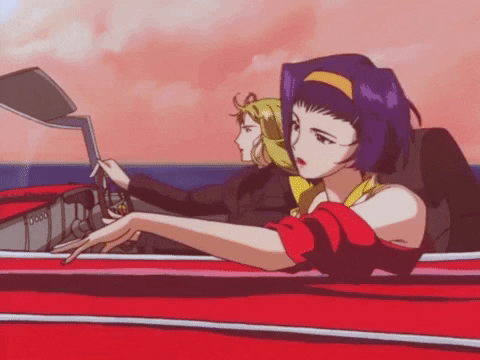
“The kind of beautiful, dangerous ordinary that you just can’t leave alone...Like an angel from the underworld or a devil from paradise.”
Most of what we get about Julia is from Spike’s point of view. From this, we learn she is at the center of Vicious and Spike’s conflict, but aside from that she is basically depicted as “The Virtuous Woman” of a noir. The colors around her are warm and she is shown caring for Spike. There is an innocence and modestly about her as well.
Yet, when we finally do meet Julia, we get a different image. We know she is tied up with dangerous men, but is she herself a dangerous woman?
She is certainly capable of betrayal.
Suddenly she is a bad-ass-gun-toting woman in leather and black, surrounded by hues of grey and dark blue. Intentional or not, Julia is a major part of what lures Spike back into the past and ultimately to his death. In this case, Julia is the femme fatale of Spike’s story and thus, their relationship is doomed from the start.
Faye, on the other hand, is portrayed in somewhat of a contrast. When we first meet her, she is the clear cut femme fatale, appearing cunning, strong willed and seductive. However, we soon find that she has quite a bit of kindness and naivety hidden behind her facade. She uses the former tactics as a way of emotional (and probably physical) protection. Gren points this out in his conversation with her.
Gren,
“You’re just afraid they’d abandon you so you abandoned them. You distanced yourself from the whole thing.”
As the show progresses, we start to see less of her “femme fatale nature” and something more genuine. Think about it, between Hard Luck Woman and RFB Part 2 we don’t see much of Faye as her typical conniving or unreliable self, aside from changing the course of the Bebop maybe. Sure she takes off, but it isn’t at all for the same reasons she did in Jupiter Jazz or Speak Like a Child, for example.
I would argue we actually see her more trustworthy and caring than ever. Since I don’t want to spend too much time talking about Faye’s character development (not here at least) I’ll give one example of this.
When she returns to the Bebop after her encounter with Julia in RFB Part 1, she gives Spike the message, even though the outcome might hurt her (i.e. he leaves and/or dies). While she does first say “It’s gonna cost you,” she doesn’t really mean it because she tells him without hesitation only moments later.
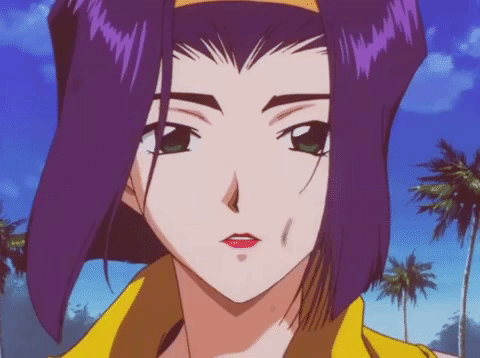
This isn’t to say Faye good, Julia bad. Both women have their layers and even though we know way more about Faye, I don’t get the impression that Julia is selfish and cunning like Kathie was. But I do get the feeling she was enclosed in a world of crime and betrayal the way Kathie was. We really only know the basics of Spike and Julia’s situation. Who knows the details like motive or how long it lasted etc. etc. We can only speculate...
There is a scene towards the end of Out Of The Past, where Kathie tells Jeff to go away with her. This time it is her asking him, just like Julia asks Spike. During this she mentions,
“I never told you I was anything but what I am, you just wanted to imagine I was. That’s why I left you.”
This got me thinking...did Spike imagine Julia as something she wasn’t? Or something he wanted her to be that she just couldn’t be?
It could explain why we get such contrasted images of her.
There are themes of this “dreamlike” relationship between Jeff and Kathie, similar to Spike and Julia’s “It was all a dream.”
The two of them were going to “live and be free,” probably something neither of them knew how to do and most likely wouldn’t have been able to get away with.
When Jet asks Spike if he can just forget the past, this is his answer.
Spike,
“There was a woman. For the first time in my life I saw a woman that was truly alive. At least that’s what I thought. She was the part of me I had lost, that part that was missing, that I had been longing for.”
I always wondered about this, because Spike is clearly talking about Julia, but right after is when Faye shows up. To me, that spoke volumes...
Faye is a woman who is terribly human and terribly alive.
Going back to Faye and Ann, I find their similarities shine not so much in the “Virtuous Woman,” concept, but rather in Ann’s dedication to Jeff and her optimism for the future. She is also the last person to talk to Jeff before he leaves for the final time, as if he were being presented with one last alternative. Spike spends his last moments with Faye as well, in which she basically begs him not to go and keep him in the present that she has now discovered for herself. She may be stuck, but she is definitely someone that yearns for human connection, love, and life.
The problem is, Spike and Faye are both set in opposite directions. Her’s leads to a future and Spike knows this because he points it out early on (My Funny Valentine). He also knows, his most likely does not. He has already dug himself too deep into this hole, if you will, that there is really no turning back.
But let’s say none of that was an issue? What could be?
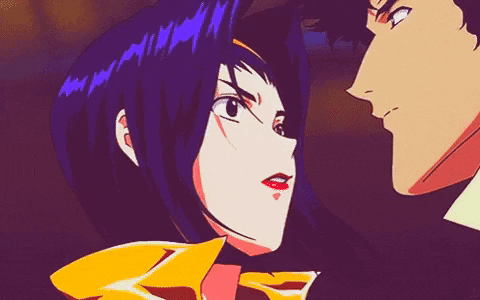
I sat and watched this movie (Out of the Past) with my mom. She didn’t know anything about it and didn’t know why I was watching it. I wanted her genuine reaction. The whole time she was getting mad at Jeff until the very end. I asked her why and she said that she wanted him to be able to live happily with Ann. I explained to her why he had to do what he did. She understood this, but still couldn’t help but be sad at how things turned out for him, when they could have been good.
Even though Kathie and Jeff are the “lovers,” of this movie, you don’t really want them to end up together. Forget that Kathie has a devious nature, regardless, you know where it has to end and you don’t want to see your hero die.
Like Kathie, Julia symbolizes Spike’s inevitable doom and Like Ann, Faye symbolizes his possible future.
“I’ll be with you till the end”
“You’re the one still tied to the past Spike!”
“Why do you have to go? Where are you going? What are you gonna do, just throw your life away like it was nothing?!”
It’s two sides of a sad coin...
We want Spike to have a future and because we love the characters of the show, it would be really great if he could have it with them, but that is where the tragedy is. It's only an idea we can think about, a possibility presented to us as it was to Jeff and Spike before their deaths.
The bottom line is, when it comes to Spike and Faye you are really only given a taste. You are not given what you expect to see, which is why I say this ship is driven by what could be. As it is with most of the character relationships in the show, no major breakthroughs are made until the very end, when it's too late. Then it just feels like such wasted potential, but sometimes in life, that's how it is. And thus, we have been given a very classic noir here ladies and gentlemen!
So no, I don’t think people miss the mark when they ship Spike and Faye, nor do I find they invalidate the show by any means. I kind of like that Watanabe switched it up and didn’t do the expected, but left us those subtle hints. He didn’t outright give Spike another lover, but he gave us someone that represents what he could have. Kind of does that with the crew as a whole too!
UGH. I love-hate this show and I love this pairing! Thank you for reading my thoughts and I know this may not be the case or reasoning for everyone, but just based on what I have seen around the community and where this show draws inspiration, this is what I have concluded. I didn’t get into Spike and Faye’s feelings for each other because it gets a little more theoretical there, but I would like to do a post on my thoughts on that as well sometime. I also didn’t touch too much on Spike’s reasoning for choosing to face Vicious in the end, just because I know that will only lead into a whole other analysis lol. But you know I have my thoughts on that and certainly plan to share them 😎 Also, I know I basically spoiled it, but Out of the Past is such a great movie!! I think if you’re a fan of this show it's definitely worth a watch! There are so many more parallels to Cowboy Bebop that I didn’t even mention. Anyways, thanks again and talk to you soon!
#Cowboy Bebop#Spike and Faye#spike x faye#analysis#cowboy bebop analysis#pairing analysis#pairing#my ship#out of the past#film noir#did i mention#I LOVE THIS SHOW#YES i've been working on this for two weeks like i was writing a midterm essay for school#DON'T JUDGE ME 🤓😂#OOTP is really good watch it#last scene gives me chills😨#spaye#faye x spike#faye and spike
161 notes
·
View notes
Text
I rate your pnat ships by how well they work as foils
I’m Professor Pops, welcome to Literature 405: comparing and contrasting in pnat ships. Love is in the air but all that really matters is narrative symmetry!

Mina and Agent Day (submitted by @anxanhh)
two women on missions who need a confidante.
Mina is a calculating woman of science with a tender, vulnerable heart deep down that she guards. Day is a fun, giggly love goddess but beneath the surface she is just as calculating.
They are both focused on their prospective goals to the point of subterfuge.
They have similar missions, to solve the many mysteries of Mayview, but they’re at odds instead of working together. Will these lone wolves learn to let their walls down and work towards a common goal?
Their spectral energies are complementary colors!!!!!!!!!!!!
9/10 so different yet so alike. They should kiss and also develop as people.
Spendcia
Where's that post about paranatural having what my hero academia wants?
These two had interacted in cannon only once before we found out they were dating, power move on Zack’s part
The cousinhood and the consortium seem to have bad blood…. Enemies to lovers????
As teachers, Garcia is tired and phoning it in while spender is energetic and committed. But when it comes to mystery solving Spender is burning himself out while Garcia keeps him grounded.
Garcia does things like pack spender lunches with little hearts drawn on the bag but was surprised to be called his boyfriend. He acts chill but inside he is deeply invested in spender but also knows about spender’s isolating tendencies.
8/10 there's a reason these two have been off and on again for 6ish years, they’re walking a tightrope of vulnerability.
Imaax (submitted by Rubyya)
The Destiel of Paranatural. No I will not elaborate.
Here’s a pnat history lesson, the original ship name was Maxaac, but Zack weighed in on twitter with a much better alternative: Imaax. Also sometimes called Team Lightning Rod.
Black and blue colors, just like the emotional bruises they leave on the people around them.
Isaac wants to be seen as heroic and Max wants to be seen as aloof. It presents in different ways but deep down they both really care what other people think.
They both fear sincerity. Isaac protects himself with theatrics and Max with sarcasm.
Isaac puts on a big show of having strong ethics but he’s a little mean on instinct. Max puts on a big show of cutting people down with his snark and devil-may-care attitude, but when push comes to shove he’s kind and cares how other people feel.
Max immediately insults every person he meets and they still want to be best friends with him, while Issac tries so hard to be cool and nice but people just can’t stand him.
The meta tension between Isaac, who wants so badly to be the protagonist, and Max “magnetic personally” Puckett who is exhausted with being the protagonist, is delicious.
There’s a reason official art tends to portray them together. They bring out the best in each other. Isaac brakes through Max’s performative pessimism and Max brings Isaac down to earth.
10/10 these two were written as a pair and it shows.
Suzabel (submitted by Rubyya)
One of my fav tropes is ‘enemies to friends’ where the enemy part is completely one-sided. Isabel probably thinks she and Suzy get along great.
Both the heads of their respective clubs, but with very different leadership styles.
Isabel only studies her grandfather's spectral style to please him and is a near master of it, while Suzy is incredibly self-motivated even though her actual skills are lacking.
Isabel is at a crucial time in her life where she’s learning to distance herself from adult authority figures in order to take on more personal responsibility. Suzy is already blazing with independence and could help her adjust.
Inversely, Isabel could teach Suzy a thing or two about treating your club members with respect and doing the emotional labor necessary to prevent future conflict.
Red and pink! Valentines colors!
Isabel could kill you but would never, Suzy would actually try to kill you.
Investigative reporter/person living mysterious double life is a great dynamic.
Back when Izzy had Eightfold they had the ship name ‘Paper Girls’ which is awesome
7/10 Don’t ask me how I know this but they would kill at karaoke together. And they’re ok foils.
Bullymagnet
Max ‘too cool for clubs’ vs a boy who defines himself by his tight knit group.
Max is learning to be less passive aggressive and johnny is learning to be less aggressive aggressive.
Max’s entry to spectral life was when he injured Johnny and saw a shade of a doctopi on him, and Johnny's first shade was Max's doctopi after the hit ball game.
Johnny refuses to commit to not bullying max anymore even though he really likes him, and max is working on being nicer but he’s still gonna be snarky with people even though they’re his friends. Old habits die hard.
If he hadn't seen that shade, Max might have joined Johnny's gang. He has the style, the stunts, the snark.
8/10 Just two bros whose lives are changing forever.
Isaac and Dimitri (submitted by Rubyya)
Here’s my pitch for a ship name: Brainstorm
Orange and blue are complementary colors.
Isaac hurt Dimitri accidentally somehow. Hurting others accidentally is the central theme of chapter 5.
Idealist/pragmatist is a classic dynamic
They both have relationships with their spirit partners that are rooted in fear.
Dimitri’s self concept is overly dependent on his sense of intellectual superiority, and Isaac’s on ethical superiority.
7/10 have not directly interacted in the comic yet but the narrative symmetry is there
Johnny and Isabel (submitted by Rubyya)
Burnhound Vs Shockadile
These two are natural leaders who know how to treat their friends with respect.
These jocks are both lethal weapons, but while Isabel is a master martial artist, Johnny is a passionate but blunt instrument.
They’re both going through similar identity crises.
Isabel is struggling to reconcile her violent and disciplined upbringing with a good, gentle heart and Johnny is trying to reconcile his violent and self-centered lifestyle with a developing respect and empathy for other people.
Johnny dies his hair red, so he would think it’s cool how Izzy emits a fiery red aura when excited.
8/10 there's a reason these two were the team leaders in the hit ball arch.
Violet and Lisa (submitted by Rubyya)
People have been theorizing about what kind of cryptid Lisa is since day one meanwhile Violet gives off big normie energy.
Lisa is very plugged into all the Mayview weirdness as the queen of the school underground, while Violet was the only person who thought to go get a teacher during the hit ball arch. Lisa was also the only one who really spoke openly about how something was clearly very wrong with Jeff, everyone else talked around it and played by the so called ‘rules’. Lisa’s secret brokering Vs. Violet’s ‘sunlight is the best disinfectant’ attitude presents two different approaches to trying to survive in a school run by a mysterious shadow organization within a town that contains several other mysterious shadow organizations.
“If you were, I’d have to be jealous too.” just two middle schoolers pinning over their crushes.
7/10 two girls against the world.
Isaac and Johnny
ship name: Firestorm?
Just 2 fiery redheaded mediums with anger management issues that command primal forces and wanna be best friends with max
Johnny chooses to have red spiky hair, Issac has had red spiky hair thrust upon him.
Both met Maxwell Pucket and decided they needed to change for the better.
I’ve said this before but Johnny and Issac have equal and opposite philosophies. Johnny doesn't care about the greater good, he just cares about a small group of people who he loves. Issac cares about the greater good, but can’t connect with individuals and ends up hurting them. Together they form one GoodTM boy.
Both their spirit partners want revenge on Spender. This spells trouble.
If there’s anyone to teach Isaac about unconditional friendship, it’s Johnny
Isaac has sworn off violence and Johnny worships at the altar of it.
9/10 they’ve only interacted in canon once so far but I’ve think we’ve got a big storm coming.
Suzy and Collin (submitted by Rubyya)
The Bakudeku of pnat. I will continue to not elaborate.
Suzy once stole Collin's phone which prompted Collin to try to cut her hair which prompted Suzy to stab Collin and at no point did either of them think to move to a different bus seat. As different as they are they are also very much the same.
Collin is the definition of mouth service (constantly disapproving of suzy’s antics but going along with it anyway.) while suzy is all action.
Despite their different attitudes they both seem genuinely passionate about the journalism club.
Fashion icons. Suzy’s sunglasses and legwarmers, Collins sweater vests and wrist bands, this duo could walk for Paris fashion week: middle school edition.
We’ve gotten an indication that Collin cares a lot about what Suzy thinks of him (taking off his wrist bands when she made fun of Max's) but we haven't gotten any sign yet that the feelings are mutual.
5/10 I think their story is yet to be told and we’ll get to know more about how they compare/contrast to each other in the future. Maybe brought on by Dimitri's betrayal?????
Cody and Isabel (Submitted by @a-bitchtm)
Cody is gay by WOG but that doesn't matter here since we are evaluating thematic compatibility, not romantic compatibility.
Red Vs. Blue
Izzy’s arch about stepping into her role as leader through communication and honesty contrasts Cody’s role as the secret class president. Izzy finally told Isaac the truth about the consortium, while Cody blatantly lied to max about being president.
Both seem to have generally good motivations and the skills/talent to back those motivations up.
Isabel is in the process of unlearning the ‘firm hand’ philosophy that she learned from her grandpa and Cody’s dad straight up tried to mind control him into murdering a toddler.
They were both taught to fall back on their capacity for violence and intimidation but those teachings conflict with the people they really want to be.
6/10 just two kids who are being led astray by authority figures trying to learn to be themselves.
Cody and Collin (Submitted by @gatortavern)
They both like vests.
Both beholden to blood thirsty predators
Collin is a journalist, Cody is a vampire/leader of the shadow government. It’s a huge power move on Cody’s part to hang out with Collin.
Cody’s support of his friends is enthusiastic while Collin would have you believe Suzy has kidnapped him.
4/10 they hang out for a reason but those reasons have yet to be fully developed
Isabel and Max (submitted by @Paranatural-goofiness)
They’re both people who have learned to put up walls to keep people out. Isabel through violence and intimidation, max through sarcasm and mockery. T
he other side of this is their mutual journey to let their walls down and connect with other people more genuinely, starting with each other.
Their search for acceptance and identity has led them both to become incredible athletes. Spectral fist martial arts = shred eagle stunts
As we saw in the hit ball game, Izzy faces things head on while Max is all about evasion. However we’ve seen how Izzy has actually learned to be evasive and guarded about her feelings while Max is a little more forthcoming.
8/10 Never has there been faster friends.
Isaac and Cody (submitted by Rubyya)
Drama kings
Isaac wants the likability Cody has.
Parallels of power: Isaac with power he didn't choose and cant control vs. Cody who also didn’t choose to have his power (elected), but wields it like an instrument.
Involuntary anime hair and involuntary glowing monster eyes
These two definitely both fall under the category of “lawful”.
I can see these two ending up on opposite sides of a conflict because they both have such rigid personal codes and an intense sense of duty.
I know I’ve been approaching almost all of these platonically but Isaac probably really wants a cool vampire boyfriend deep down
7/10 Unstoppable force, meet immovable object. You two should watch anime together.
Hijack and PJ (submitted by @gatortavern)
They both wanna join the activity club so bad
Both have immature ideas about heroism and villainy.
Both aspire to heroism while at the same time understanding that they aren't that yet and maybe never will be.
They both, like many people in this comic, wanna be friends with max.
5/10 Two supernatural babies who should play wii sports together
Stephen and Isaac (@Gatortavern)
Two boys who are easily overwhelmed
Lawful vs. chaotic
Isaac has enough secrets to give Stephen his conspiracy fix for a long time.
In their own ways they both just want everything out in the open.
Isaac is Stephen's dream, someone actually living a secret double life, and Stephen is Issac's dream, someone with a cool scar who would think he’s actually very interesting.
5/10 these two are both very intense in their own way.
Johnny and Ed (Submitted by @theevilbrainman)
Two souls lost in the wind
Two people for whom friendship and loyalty is central to their character, and they’re both struggling with personal growth because of it. Johnny is afraid to change because his friends have always liked the person he already is, and Ed is struggling to even define himself outside of Isabel, the person he cares about the most.
Both impulsive and uninhibited.
They both live lives free from expectation. Johnny’s wild bully persona means no one is surprised by his antics or cruelty, while Grandpa Guerra doesn't really care if Ed takes up phantom fist like Isabel. He actually calls him a freeloader. Not having much expected of you can feel free but it’s also lonely and can warp your self-perception.
6/10 these two crossed paths at exactly the right time.
I didn't cover every submission because even though only 9 people submitted you sent in 34 ships between you. Pnat’s fanbase is small but very dedicated.
Honorable mentions:
Johnny and clear sinuses, submitted by @gaul-the-unmitigated
Isaac and therapy, submitted by both @squidgeons and @somethingfishysgoingon
PJ and Johnny, submitted by @gatortavern, who seems to be under the impression that Johnny Would protect PJ and not destroy him just by breathing near him.
Day and Scabs, submitted by @gatortavern, because funny.
Special thanks to everyone who sent in ship between people who have never interacted in cannon, which was a lot of you. My eyes are opened now, so many possibilities.
#paranatural#pnat#q#ships#valentines#dr. zarei/agent day#imaax#spendcia#suzabel#bullymagnet#shipping#pnat spoilers
132 notes
·
View notes
Text
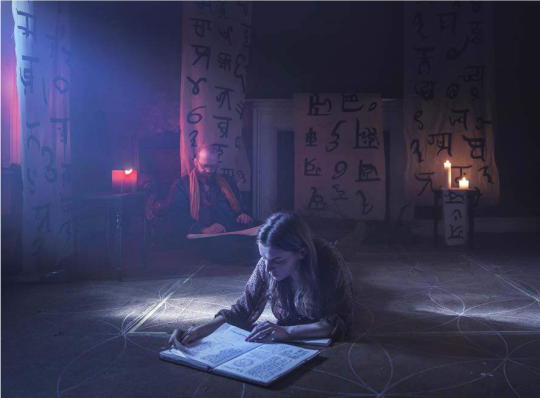
I've been slowly worming my way through the last two or three years' worth of Fangoria back issues, which is mainly taking so long because I've been sidelined by research projects, but it just took me about a full day to get through this three page article on how occultism is misrepresented in horror movies. I found it so frustrating, I could only take a couple of paragraphs at a time. As soon as you see the headline, you're like, no duh. Horror movies are not documentaries, they're works of fiction meant to provide, you know, thrills and chills. They're often fantastical, or so exaggerated as to count as fantasies that are allegorical at best, and they often explore irrational or primordial fears. They're not here to, like, tell you how to live your life. It's sort of perplexing because the author's prose is pretty good, but her argument is like...well, I don't know what she really wants. She doesn't seem to think anyone is in danger from inauthentic movies and TV shows. She admits that practitioners of Abrahamic magick are generally not harmed by misrepresentation in media (and would prefer that their traditions remain obscure to all but serious students anyway), and that the only real effect of people getting lifestyle inspiration from shit like AHS: Coven is just a proliferation of scammy garbage on Etsy. She doesn't think vulnerable goth kids are going to get burned at the stake because of creative liberties taken in HEREDITARY. She also doesn't express concern that fiction is killing public curiosity about alternative spiritualities. Yet, she still seems upset about the fact that filmmakers will take the seeds of something from real life, like wicca or hermeticism, and use them as mere ingredients in a completely fictional narrative that is free from historicity or didacticism. And the sense i'm able to make out of this, from my personal experience, is that hardcore occultists are often REALLY boring people.
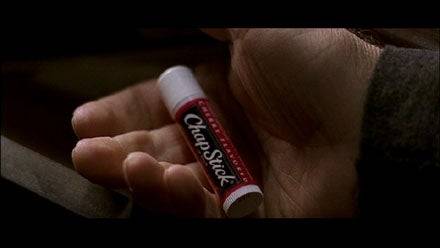
My friends and I usually just refer to this movie as THE CHAPSTICK PROPHECIES.
I listen to Damien Echols speak pretty regularly, and while he's wonderfully interesting about his area of expertise, he calls artmaking for personal or social reasons (as opposed to spiritual or scientific reasons) "cultural cannibalism", and his favorite movie is THE MOTHMAN PROPHECIES just because he considers it to be so factually sound--never mind how impenetrably dull it is, or that it doesn't make much meaning out of what it reports. He has no time for anything aesthetically or emotionally driven, he just wants things to directly reflect the fabric of reality as he understands it. I'm also reminded of Michael Aquino's 800-page memoir about the rise and fall of the Church of Satan, which contains quite a lot of laments from himself and LaVey that colorful B movies like THE DEVIL'S RAIN don't portray Satanists accurately as sober, ordinary, law-abiding business owners whose chief shared quality is a preference for objectivism. The fact that absolutely nothing about THE DEVIL'S RAIN resembles real life, and it is absolutely not meant for use as an educational tool, didn't seem to enter into the conversation; it was all about this anal retentive urge for all creative production to be rigidly "realistic" just because that's somehow inherently superior. Which is like the omega version of that difficult friend who pretentiously points out that obvious special effects are "fake" all the way through any movie you're watching. The changes these people want to see in movies and television seem to suggest a world where all entertainment would be too boring for PBS. The next time your crazy QAnon uncle starts to make you wonder whether there really might be occult cabals running the world, just remember that if that were true, all media would become so tedious that you'd be going outside to play for the rest of your natural life.
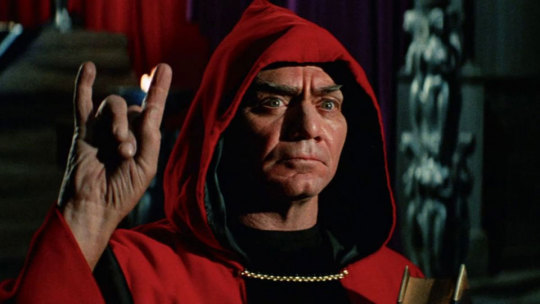
10 notes
·
View notes
Text
Vanitas no Carte Mémoire 49 Analysis
It took me a great deal longer to get to this than it normally does. Life has been busy! But what a chapter; there were a lot of unforeseen things that happened in this one.
The previous chapter explored Misha and Vanitas's time with Dr. Moreau and their eventual in the form of Vanitas of the Blue Moon. This chapter continues that thread and we get some idea of what their time with VotBM was actually like. Needless to say, it's a bit different from what I anticipated.
VotBM's personality is a lot more easy-going in a lot of ways than I thought it would be. Before now, all the flashbacks portrayed her as a somber person, but, of course, we were only seeing her somber introduction at Dr. Moreau's lab. There are certain impressions I had of her that haven't changed, though, and that's that she is powerful and knowledgeable.
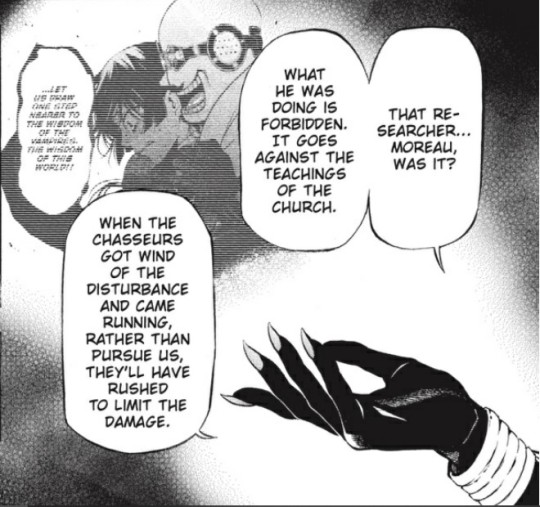
Right here we can see she has a pretty good understanding of the chasseurs and how they operate, but we notably still don't know why she was there to begin with. Later in this chapter, Vanitas directly asks her why she has saved them, which is essentially asking why she was there, and she doesn't answer. We never get an answer and I find that a bit suspicious. Why not say something even if it's just "they were bad people and I wanted to stop them?" But she doesn't, which implies that isn't why she did what she did.
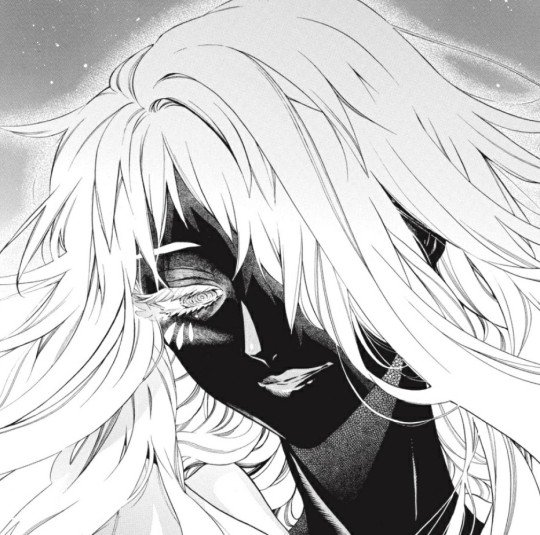
We finally get to see VotBM's facial features as well. I think I've seen some people compare her looks to Faustina's, but I'm not sure I can see that very well just yet. It certainly would be interesting if they turned out to have a connection, though! What I can say is that VotBM's eye has many spirals in it, which is similar to Ruthven's. If this is a mark of a vampire's power (and a vampire's eyes do seem to have a lot to do with their power) then I think it's safe to say VotBM is very powerful indeed. She also has some crystalline decorations underneath her eyes and I can't say if that's actually part of her skin or just makeup. If it is part of her skin, perhaps it's another mark of being born under a blue moon? Or perhaps of her power?
Regarding her eyes, I will also note we only ever see the one; her other eye is conveniently covered by her hair. Is it because it's missing or is there some other reason? Vanitas, when he tried to hurt her, went right for her eye, which is how she identified he'd had chasseur training. Could she have had a run in with some chasseurs that went badly at some point in her life?
Another impression I had of VotBM was that she was a loner outside of Vanitas and Misha, but that is quickly disproven as well. She says "Those around me call me Vanitas" and she acquires lodging through a human contact. Therefore, VotBM must speak with people a fair amount, and by the sounds of it she speaks most with humans who dabble in the occult. When you think about it, it makes sense. Other vampires would be too frightened or suspicious of her to want anything to do with her, while devout humans would likely see her as a devil. But humans that are also outsiders with their beliefs? Perfect companionship for one such as herself. I wonder where this puts dhampirs. Would she interact with them or would they be more likely to share most vampire's views on her? We've never heard Dante talk about her nor any of the other dhampirs, so I guess we can't say just yet.
Getting back to VotBM's name, it's interesting that she says she doesn't have a name she likes yet. Names have a lot of meaning for vampires. I wonder if she's being honest when she says she simply hasn't found one she likes or if there's another reason for not choosing one. Maybe a name, even one that isn't a true name, can have power and she doesn't want to risk it?
So, we learn a little bit about VotBM, but we also learn some things of Vanitas. Oddly, while these are supposed to be Misha's memories, I feel like we're learning a lot more about everyone else. I suppose he is trying to show Noé that VotBM was killed by Vanitas and that is why he should help him, but still.
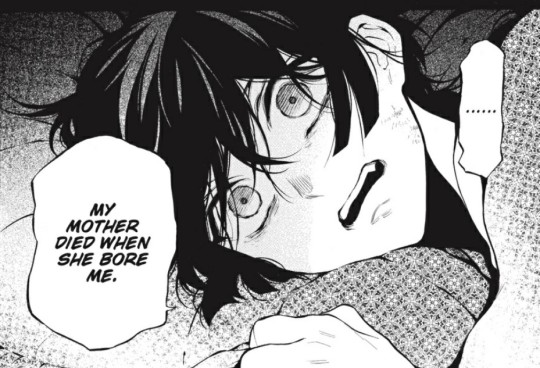
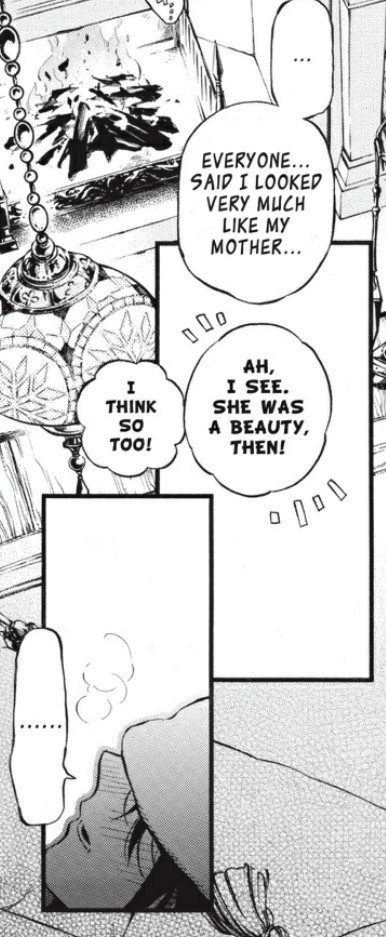
I think we're starting to get to the root of some of Vanitas's issues with women at long last. So, he never met his mother, but he's constantly told he looks like her. He assumes his father must have hated him for taking his mother away, which implies his father did something to give that impression, though we aren't told what. And then there's the small matter of Vanitas doing all the feminine chores of the household. This one is a lot more indirect, but we can infer it from a later scene with Misha and VotBM:
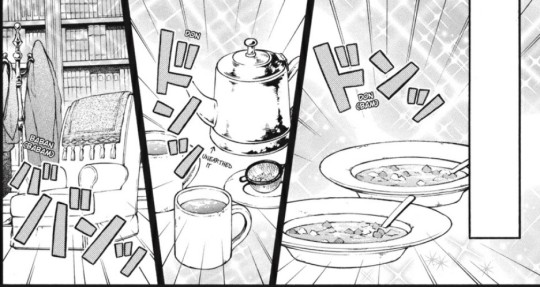

So, VotBM is a bad cook. It's portrayed humorously, but what we really learn is that Vanitas is a great cook. And a great tidier. It also looks like he continues to do the baking for their trio judging by the second panel and it looks like quite elaborate baking as well. It also continues to be proven that VotBM honestly has no idea what to feed children whatsoever judging by the alcohol. At least she only gave it to Vanitas...
What I'm getting at, though, is that in order for Vanitas to be this good at cooking and cleaning, he'd have to have done a lot of it already. It's possible his father was a meticulous person and taught him. Perhaps it's something they enjoyed doing together. Or, alternatively, without a wife he gave all the traditionally feminine tasks to his son and expected him to take care of things. I kind of think it's the latter considering Vanitas's issues with women. He was constantly compared to his mother visually when he was young (and indeed both VotBM and Misha exclaim she must have been beautiful, implying Vanitas himself is beautiful like a woman), was likely expected to maintain the home, and his father may have resented him for not being his wife. We also have Vanitas trying to be a doctor in the present, which was his father's profession. Indeed, Vanitas has gone out of his way (in some regards; his hair is an anomaly here) to behave in a "masculine" fashion: he tries to take charge of his relationships with women, makes digs at other people (i.e. Astolfo) for looking feminine, and is trying to pursue a career he associates with men's work. Talk about a lot self-image problems all rolled up into one person!
And here's the thing. I think Vanitas might genuinely enjoy cooking and cleaning to some degree (he certainly dislikes messiness at least), which might make things all the worse for him since I think he's trying to assert is masculinity and he probably doesn't see that as masculine. It's hard to say; we still haven't heard much from Vanitas himself on a lot of different matters.
Another revelation about Vanitas this chapter is just how kind he is, as much as he does his very best to hide it both in the past and the present.
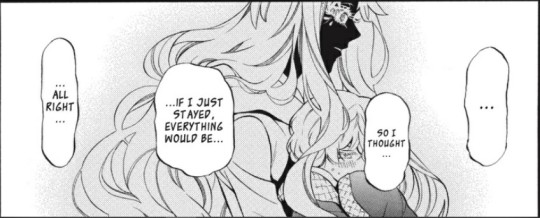
VotBM points out that with his chasseur skills, Vanitas could have easily escaped from Dr. Moreau and his lackeys. So why did he stay? And the reason was very simply so that no one else would be hurt to get to him. Someone--a stranger--had been killed so that Moreau could kidnap Vanitas. If he escaped, how many otherw would be hurt to get him back?
Earlier in this arc we saw that Vanitas allowed himself to be tortured to protect Misha. I found this surprising because, while it's in character, it's also an extreme action to take. But now we discover that Vanitas didn't just do that because he kind of knew Misha; he cares so much about others' lives he subjected himself to Moreau well before he met Misha.
Vanitas has a lot of things to work out in the present, but there's no denying there's a genuinely good and kind person underneath all his hangups, and that person is coming to the forefront more and more as the series goes on. Even though things started out remarkably poorly with Jeanne, there's no denying he is trying to help her in his own way, and he's been softer towards Noé lately as well. Vanitas does care about people; he just wishes he didn't.
Around this point, Noé begins to surface from Misha's memories or at least they begin to fast forward. Still, there are a few important points that are made before the chapter ends. One of those revelations is that Moreau's experiment on Vanitas and Misha nearly worked: they were very nearly rewritten into being vampires. But it didn't quite work and they're now hovering between the two races. I wonder if this is a problem dhampirs have and, if not, why not? All of this has raised a lot of questions about dhampirs for me. Regardless, VotBM solves the problem by making them her kin. I don't quite understand how marking them prevents them from being rewritten. I mean, I think it was a temporary fix because if they use her power they wind up rewritten anyway, so I guess it's more like stuffing a shirt into a leaking pipe. It slows things down, but you still have a problem.
Misha accepts VotBM's offer readily, but Vanitas flat out refuses, saying he wants to "stay human until the very end" and if that isn't ominous foreshadowing I don't know what is. What does being rewritten mean now that he's been marked by VotBM? Will he simply die or will he lose his humanity instead? But despite Vanitas's refusal, we know he is marked by VotBM. Did he change his mind or was it forced on him? The flashback doesn't say. But it does show us this:

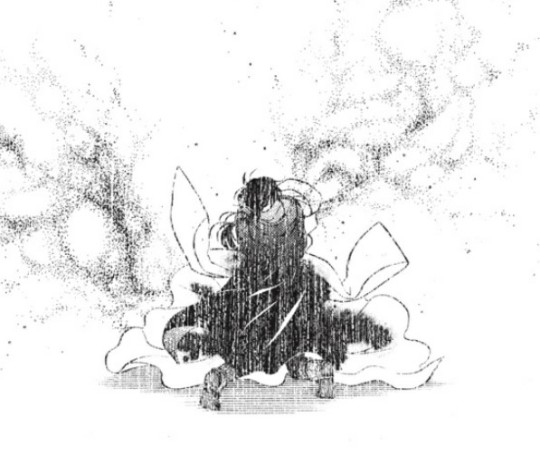
That first image is a little unclear. I'm positive the text panel was placed in just such a fashion to obscure important information, but basically we see that Vanitas was marked by VotBM. There's blood all over him, which also implies there was either a struggle to prevent this from happening or, I guess, he was coughing up blood and dying. Misha was bleeding quite a bit as he was being rewritten, too. Hard to say. But the second panel shows that Vanitas really did kill VotBM. Unless she can come back from the dead, she seems pretty definitively dead, turned to dust and everything, and it's heavily implied he killed her for marking him.
And yet, that still feels nearly too straightforward. I don't actually have an alternate theory at this time, but I have to wonder if that's all it was or if there was more to it. It's decidedly strange for him not to just tell Misha; certainly Noé's life would be easier right about now if he had.
And speaking of Noé and Misha, we have jumped back to the present! And Vanitas has arrived!

I had wondered how Vanitas would react when he found Misha and Noé, whether he would be furious, shocked, appalled, etc. It seems, for now, that he's settled on "dour acceptance." He definitely doesn't look shocked, so he had some idea of what Misha was going to pull. And while he doesn't look happy he doesn't look overtly furious either. Very curious how things are going to continue in the next chapter, which to my understanding will be in March. Ahh, let's do our best to wait patiently! I really want to know what happens. XD
93 notes
·
View notes
Text
A lot of people probably are gonna hate me for this, and if you disagree with what I’m about to say, please don't bother to respond, just ignore me completely and move on, go make yourself happy.
It’s just that I honestly don't see how this:
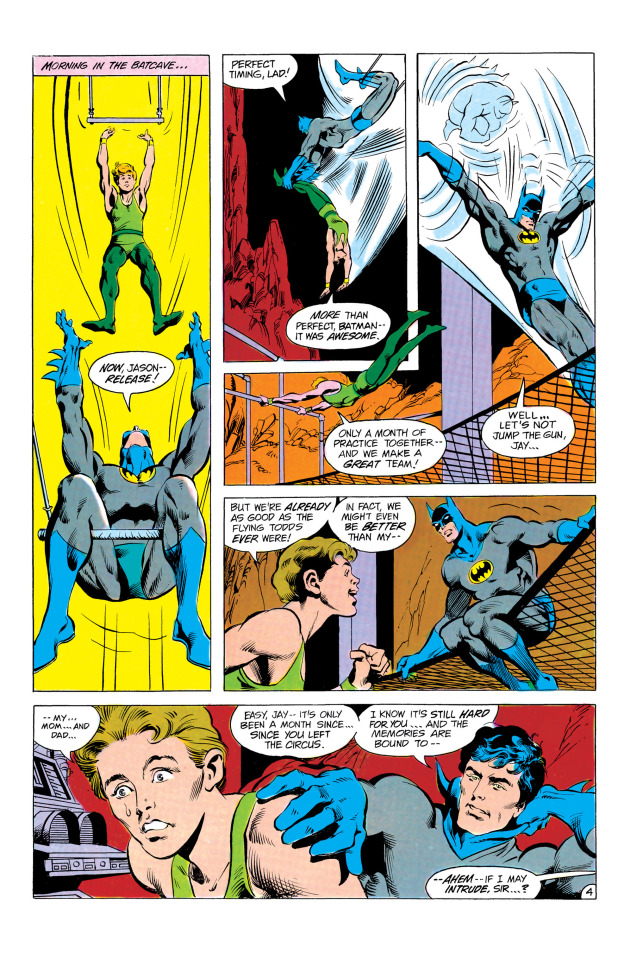
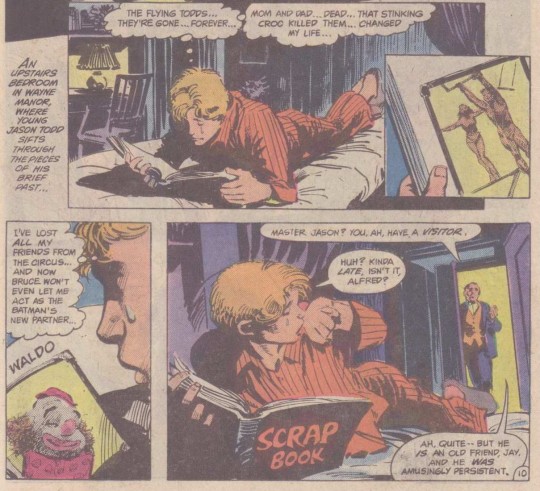
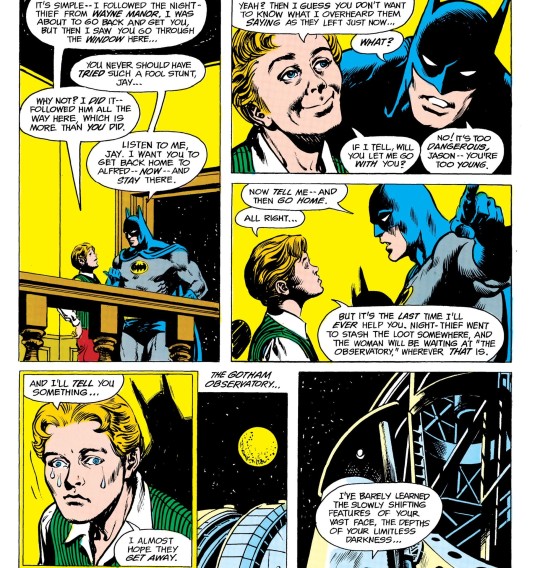
can be the same as this:
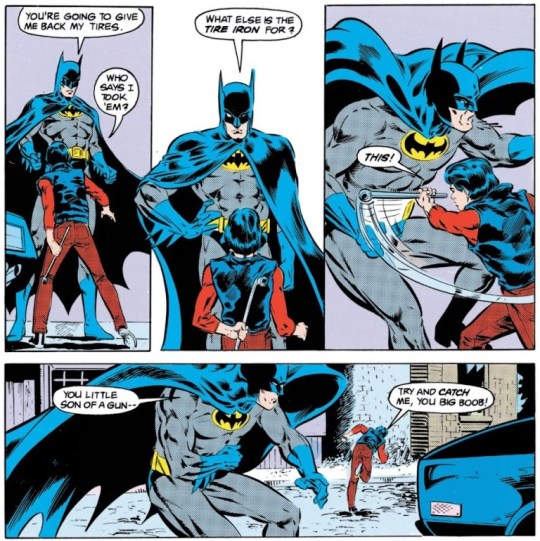
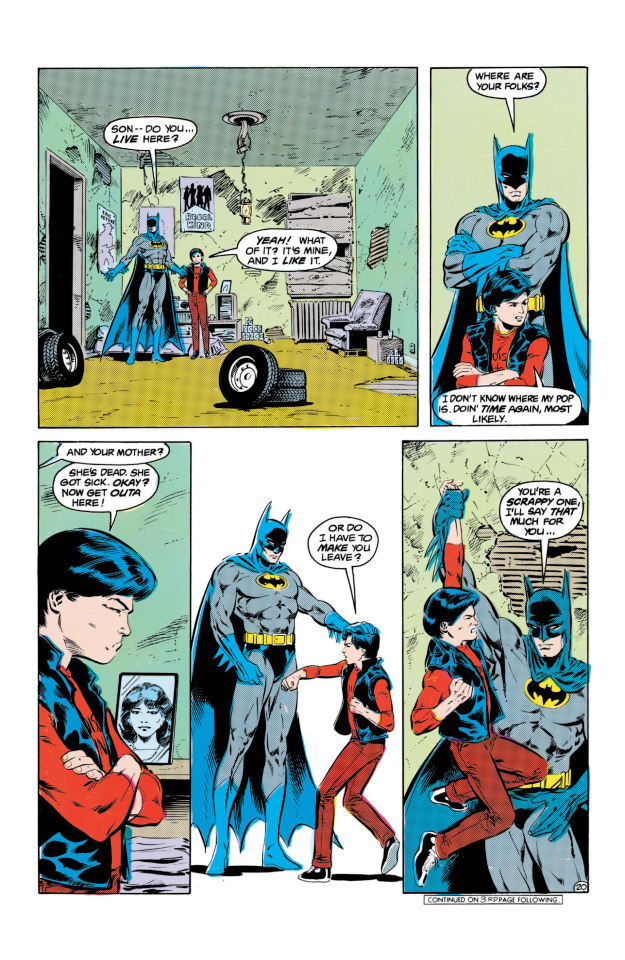
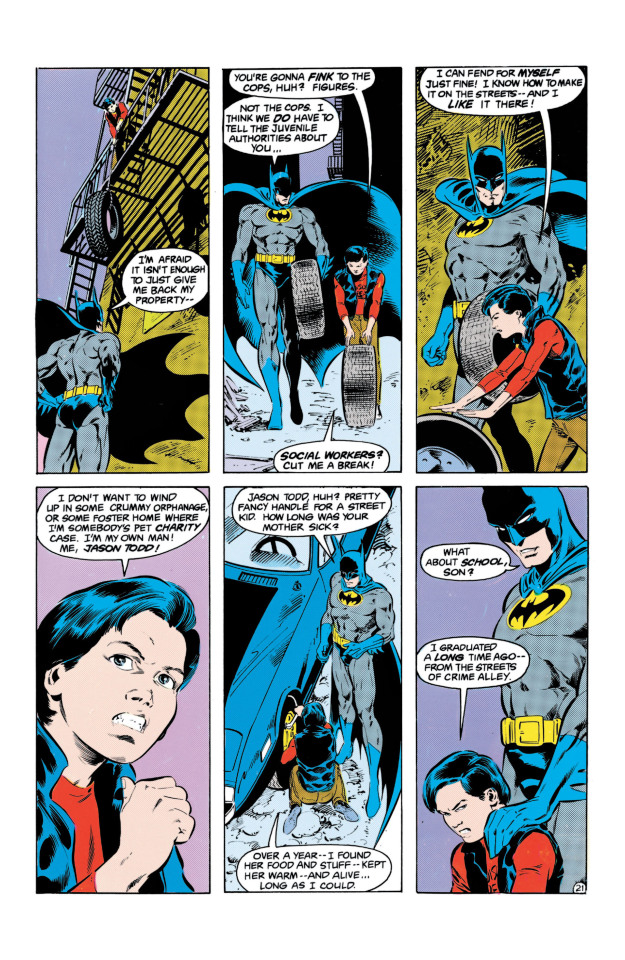
Personally, I don't care for Dick-lite Pre-Crisis Jason at all, because he’s never seemed to me a real character with any real personality of his own, and I just really don’t buy the idea of a teenager, with still very recently murdered parents that might as well be every bit as the same kind of loving parents and positive influences to their kid as the Flying Graysons, getting over the loss of their old parents’ and accepting someone they’ve only just met around the time their parents died as his true new parent in practically no time at all...especially when it’s happened in a world where a preteen could end up spending the rest of his adulthood fighting crimes in a bat suit after witnessing his parents being gunned down by a mugger.
The only thing Pre-Crisis/Earth 1 Jason Robin seemed to have going on was being a son to Batman/Bruce (and a son to Nocturna, because clearly if he could’ve gotten over his real dad so easily, why wouldn’t he have also gotten over his real mom and come to think of this mysterious criminal lady as his true new mom when she had wanted so much for him to be her son and they had lived together for like a week)--and I feel that if the executives at the time had really wanted Bruce to become a dad, they'd probably just let him settle down and give him a biological child as in the Golden Age, but instead they gave him a second Robin; and the way they laid themselves out to make the relationship between him and this second Robin to be exactly father-and-son despite the fact that Bruce would’ve had to be real stupid to actively endangering a young person whom he consider his own little boy by bringing him to fight crimes just never sits right with me.
It always seems to me like they’re just trying to retcon the original Batman and Robin relationship without actually retconning Bruce and Dick, who hadn’t really been Bruce’s adopted kid just then and had often regarded his mentor Bruce as more of his older brother/closest friend rather than just plain old “dad”--It’s like they’re just trying to remove every implication that there's ever anything gay/creepy in the original Batman and Robin dynamic, simply by bringing in another Robin character, one with the exact same backstory as Dick and nothing that could actually differentiate him from Dick (except him being originally blond-haired and himself outright telling people that he’s “not Dick” in one of his few featurings in the New Titans where he’s portrayed as every bit as much as a smart, decent, capable young person equipped to be a successful young hero just as Dick Robin or Tim Robin would’ve easily been portrayed), and making his relationship with Batman to be plainly, unequivocally father-and-son, then with there being no actual difference between Robin II and Robin I and the two Robins being virtually the same, sure the viewers would see that the relationship between Batman and Robin II and the relationship between Batman and Robin I are very much the same too, and no one could say if there’s any resemblance of a gay couple with a creepy age difference in the original Batman and Robin’s dynamic ever again since they’ve always been father and son.
It just feels so manipulative to me and I hate it, but that’s just how I feel and I’m not saying that it’s truly the case. I’m sorry if this offends anyone who loves Earth 1 Jason. If you love him, that’s great. There’s nothing wrong to love a wholesome Robin and his altogether wholesome relationship with Batman, nor there’s anything wrong to love Red Hood Jason but prefer his softer New52 version which would’ve certainly seemed to be a less drastic change from his Pre52 version if he’s more like his Earth 1 counterpart to begin with.
There’s absolutely nothing wrong to prefer one version of a character to another, to just say fuck canon and recreate a character you love into the way you could enjoy them most and have all the fun you want with them.
What gets to me and drives me bonkers, is when people couldn’t just be happy with their headcanon, but have to go out of their way to tell other people that it’s fact that Pre-Crsis/Earth 1 Jason and Post-Crisis/New Earth Jason are the same character, while in actuality, they weren’t even meant to be the same in the first place.
If DC had ever wanted to just keep using Pre-Crisis Jason but give him a new backstory, they would just follow up on whatever he had been doing with Bruce as his pre-crisis self while casually throwing in his new backstory at some point, just as they did with a lot of other characters such as Donna post-crisis, not give him a full reintroduction in Batman #408 and rewrite his relationship with Bruce from the ground up.
It just makes me want to scream, when people, who never seems to have a lot of problems with Under the Hood and maybe also Lost Days, have to go out and call every portrayal of Pre-52 Jason and some of the more recent Red Hood Jason that shares a resemblance to him wrong for not portraying Jason as that sweet little bookworm he really truly was, and that an entire different life experience just cannot change a character in any substantial way, and Jason being an angry kid with aggressive and violent tendencies is just something that had never been established until the more recent retcon/the OOC work of Jim Starlin, while in truth Pre-Crisis Jason with the exact same backstory as Dick just simply cannot be the same as Crime Alley Kid Jason, who doesn’t even have the same biological parents as Pre-Crisis Jason to provide him with the same gene that the Flying Todds, which were Joe and Trina Todd, had created their son with.
If Pre-Crisis Jason and Post-Crisis Jason are one and the same, then it’d mean Dick is also very much the same as Jason is the same as Tim is the same as Damian is the same as Bruce and no one character is truly unique and special because every character ever made is just an alternate version of another character.
It had been shown most clearly since his first appearance that Post-Crisis/New Earth Jason, other than literally being a different kid with the same name, was nothing like his pre-crisis counterpart, but rather a bold, outspoken, confrontational, fully independent and proactive ghetto kid, who had got some serious stones to rob Batman’s gear, actually succeed in taking the tire off the freaking Batmobile and getting away originally, and had only run into Batman when he had come back to steal more, and called Batman a “big boob” after he had given him a good hit right in his Bat stomach.
This precious cupcake here↓

↑...that was often used as a proof that the NE Angry Robin Jason is a later retcon/ mere misconception had actually only ever existed in Detective Comics #569-573 during the earlier part of the writer Mike Barr’s run. These 5 issues from Barr are all notably 60s-ish, and while they’re published after CoIE and Batman Year one, it’s clear that they’re Earth 1 stories, seeing that they’re written with characters such as Earth 1 Catwoman. It was only in #574 that Jason’s New Earth origin was first introduced in Detective Comics, right before Batman Year Two; and although the issue was still written by Mike Barr and it did seem to have followed directly after #573, the previous issue was ended with the caption of “The New Origin of Batman”, and the tone of #574 as well as the writer’s latter issues and his portrayal of Jason Robin were no longer the same.
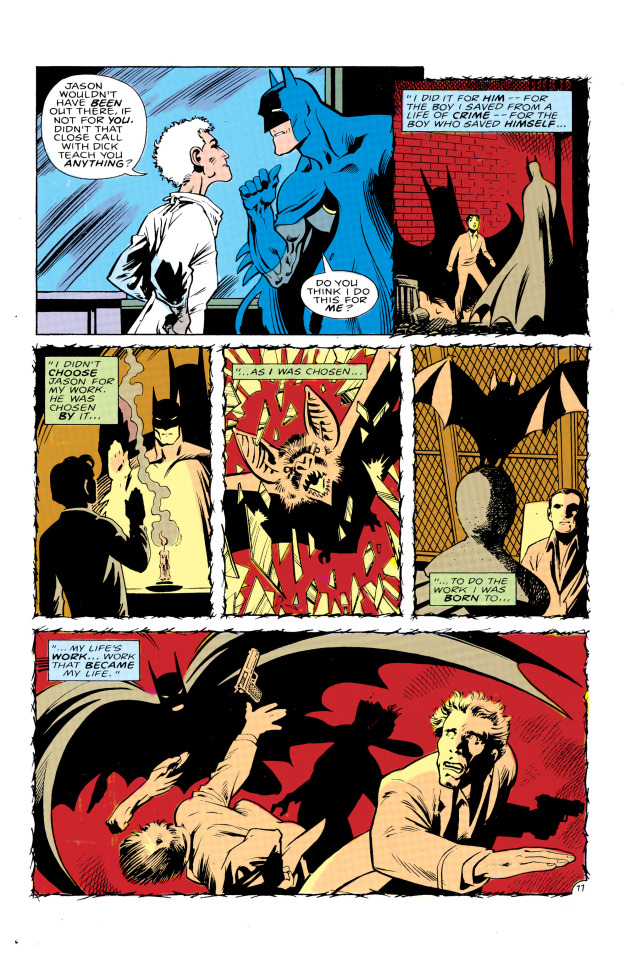
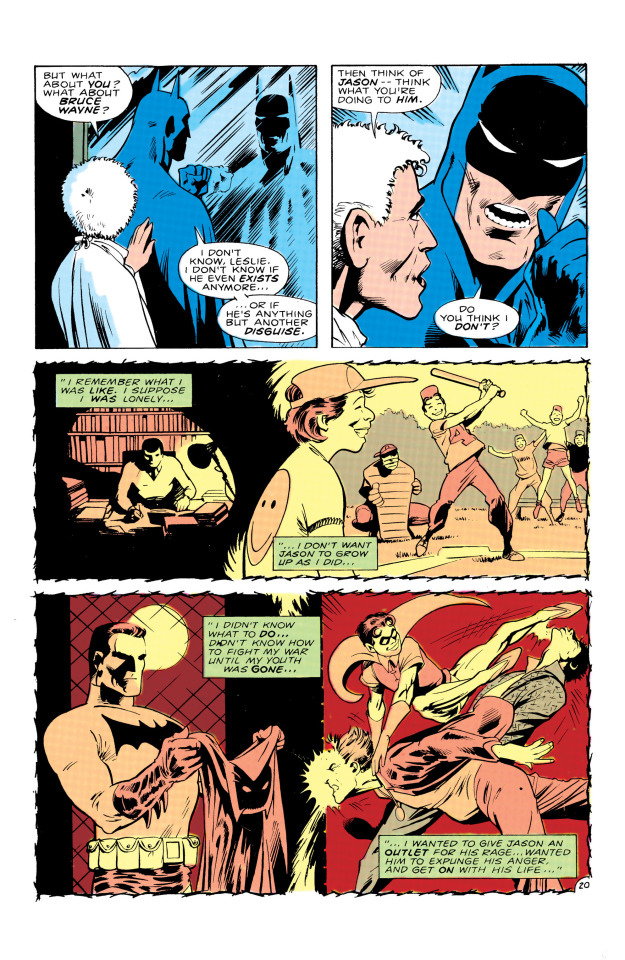
↑Detective Comics #574↑
It was stated by Bruce repeatedly, in both his own title and Detective Comics, that the reason he had taken in NE Jason as his new Robin was to save him from walking down the wrong path and to provide an outlet for his rage.
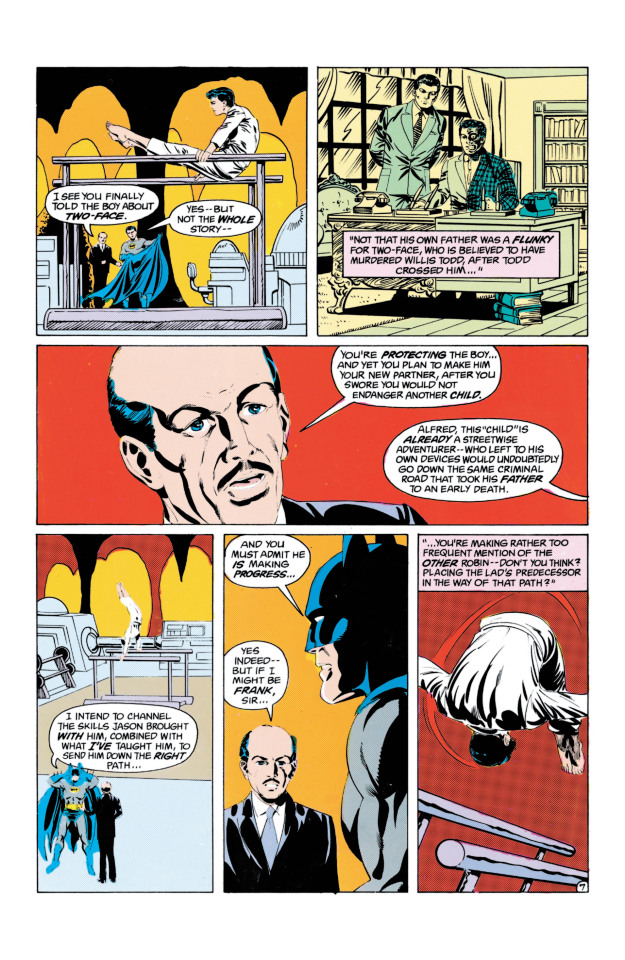
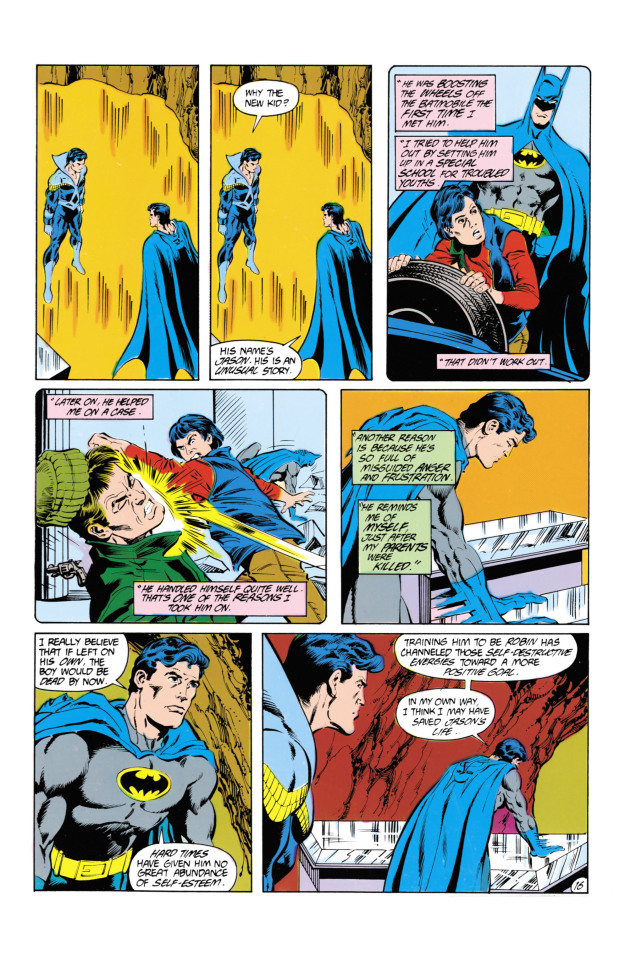
While no doubt Jim Starlin’s NE Jason Robin (that everyone hates) was the most aggressive and violent, it had never contradicted how the character was initially written by Max Allen Collins, the writer of Batman #408.
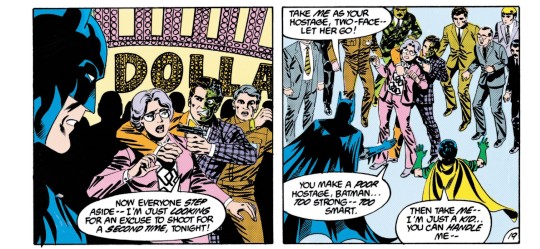
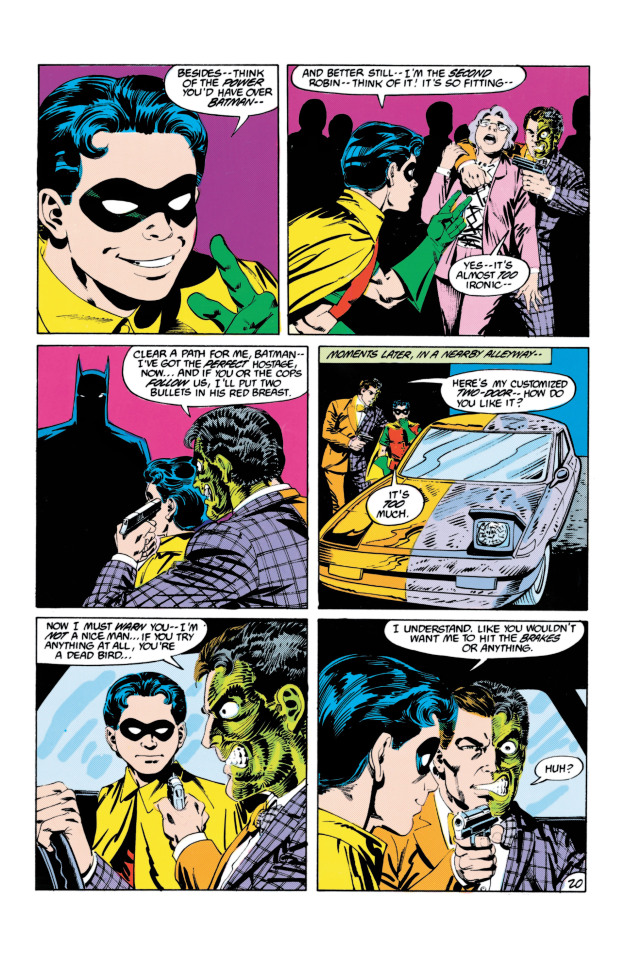
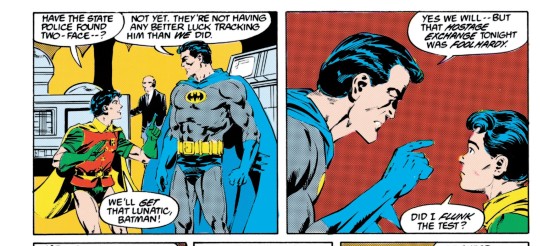
↑Batman #410 by Collins↑
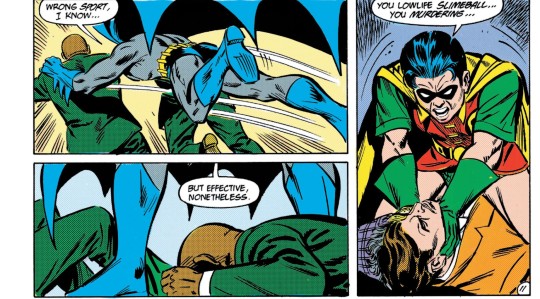
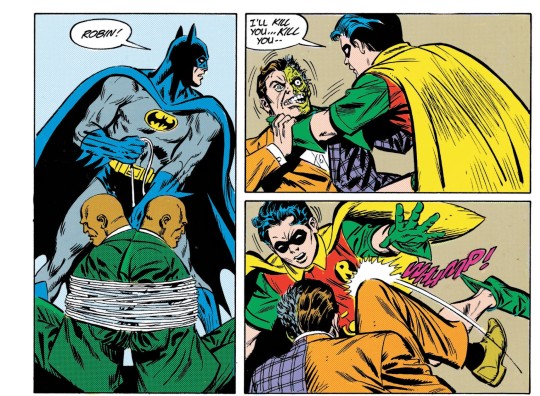
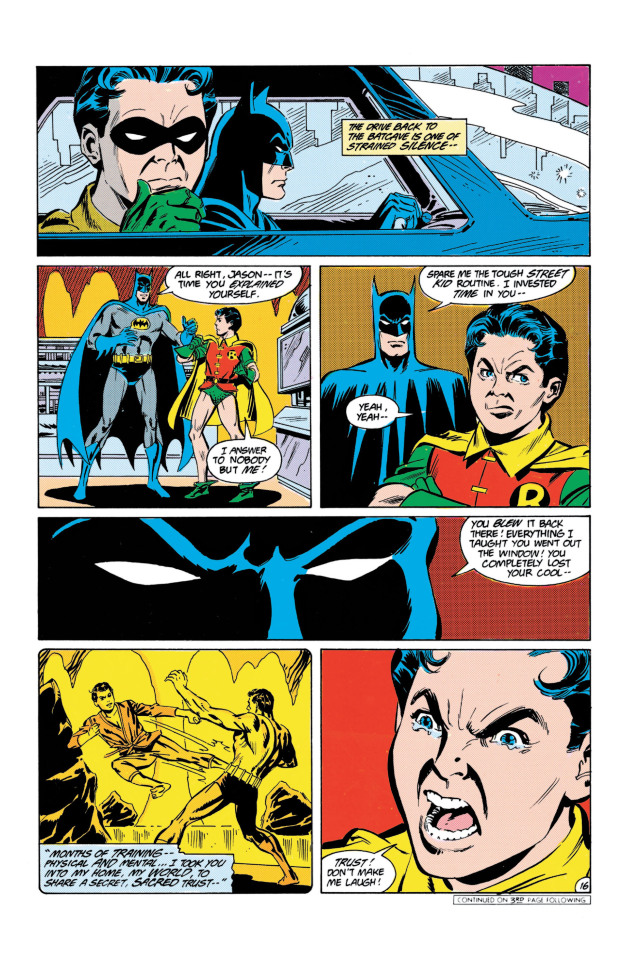
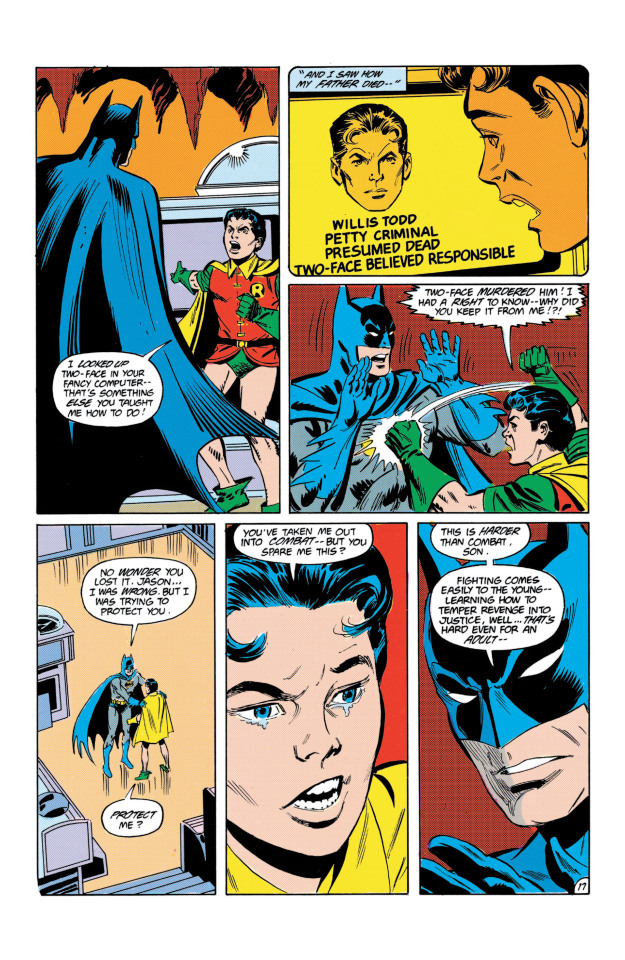
↑ Batman #411 by Collins, after Jason had found out that Willis was murdered by Two-Face and Bruce had been hiding the information from him ↑
Although in the end of Batman #411, Jason did seem to have gotten over his anger and saved Two-Face’s life, judging by the way he’d talked about his dad Willis in his first introduction and the fact that he’d never before bothered to find out what had happened to the man the whole time while he’s in the manor where he had all the resources to acquire the information, it was doubtful that he and Willis had had a good relationship, and what he’d felt for his crook dad then could hardly be the same as what he felt later in “The Diplomat’s Son” story.
NE Jason had always been consistent in being a fearless, proactive, feisty individual with a hot temper, even in the hand of a writer with a much mellower sense of writing like Mike Barr.
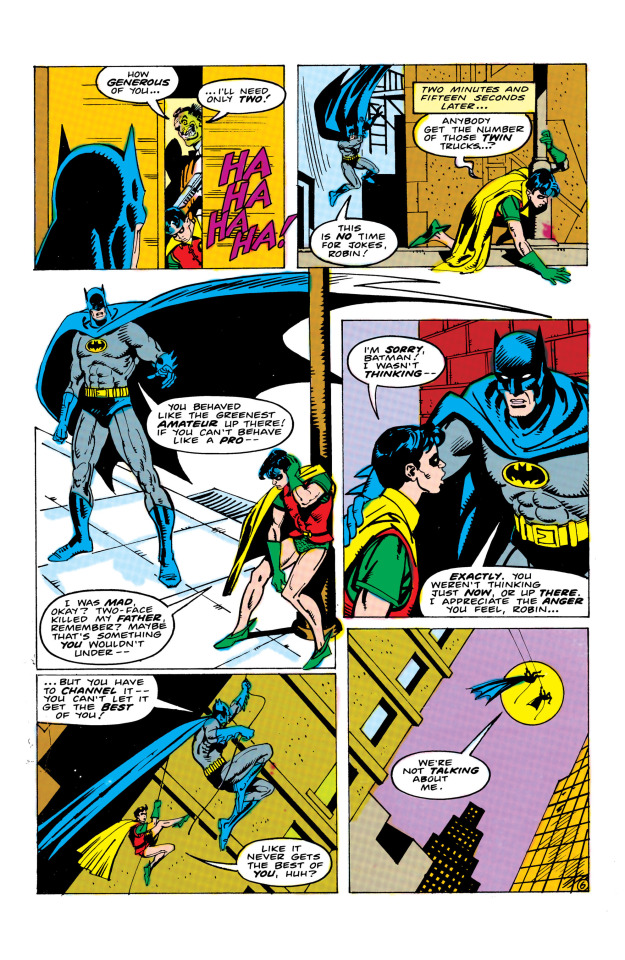
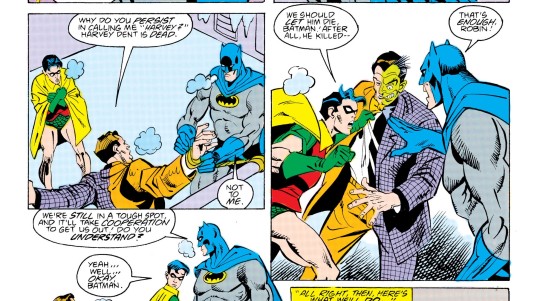
↑ Jason and Bruce encountered Two-Face again in Detective Comics #580-581 by Barrs ↑
It had been established from the get-go that NE Jason Robin was the type of kid who would challenge Batman and go out handling a criminal on his own without consulting him or anyone else first, and was morally questionable with tendencies to aggression and violence, which was perfectly understandable for someone with his background--Only at the beginning it’s easy to brush these things off, because there's never any real consequence to his behavior and so Bruce was okay when he’d behaved this way at the beginning, and since Jason’d still got a lot to learn and was eager to learn from Bruce at the beginning, it would only be right that he’s more agreeable and willing to obey Bruce, but once he had completed his training and been allowed on the field, it would also only be right for him to feel like he had learnt enough and gotten the hang of the business already, and so just easily slipped into his old habit of handling things on his own, just as he had always been while he had been surviving in the Crime Alley on his own before Bruce came along.
NE Jason Robin wasn’t suddenly turned from 0-100 in The Diplomat’s Son story (though I really doubt that it’d be impossible for someone, especially someone around Jason’s age, to go from 0-100 if they have to deal with what Jason had dealt with in the story)--
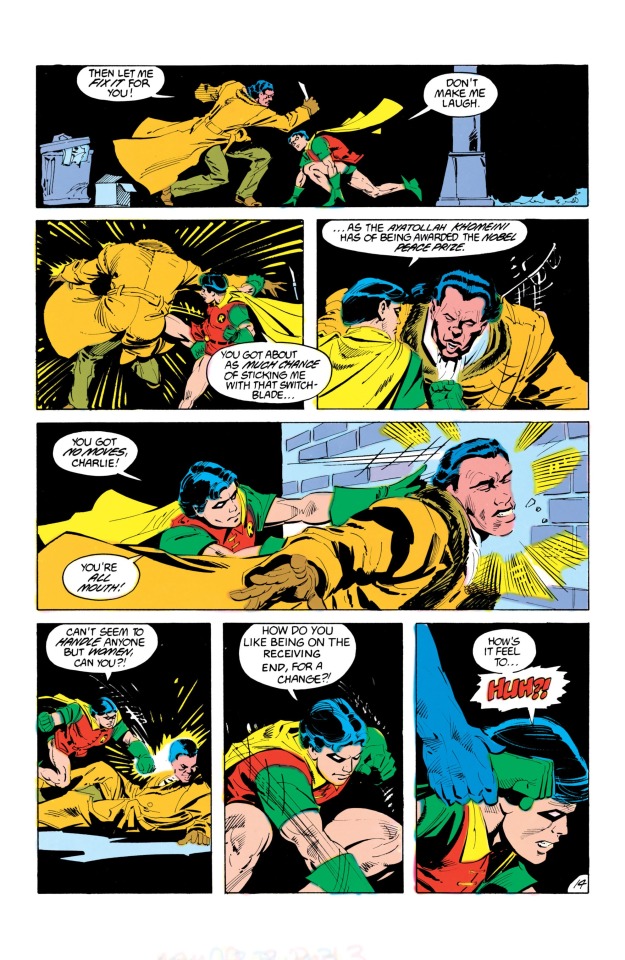
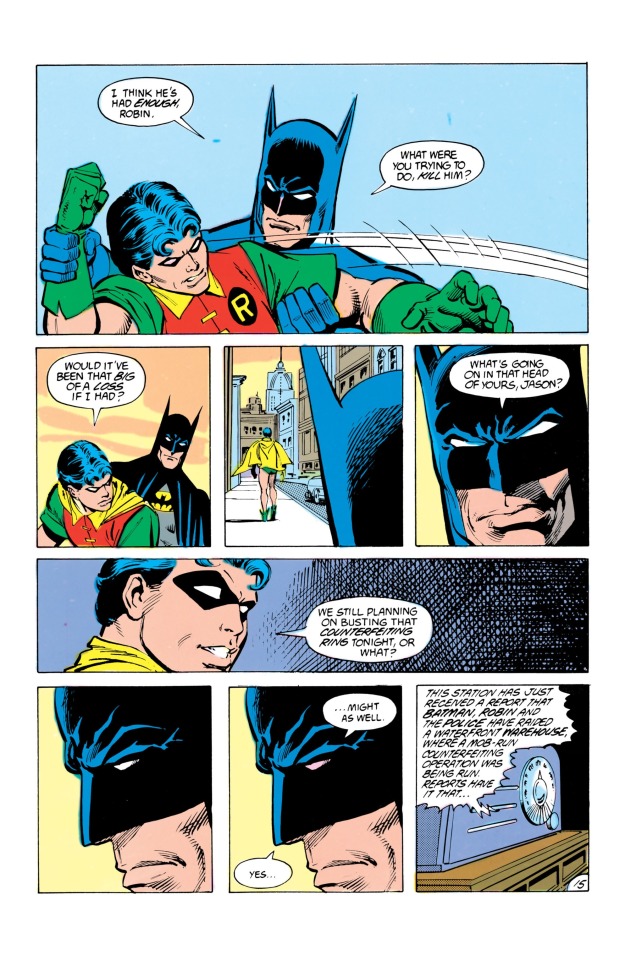
↓ This didn’t happen until after the diplomat’s son was let go by the police due to his status, and on his way out of the police station where he’d been initially brought in by Jason and Bruce for raping and kidnapping an innocent woman, the mofo called his victim right in front of Jason and Bruce and threatened her on the phone, which led the woman to immediately commit suicide.
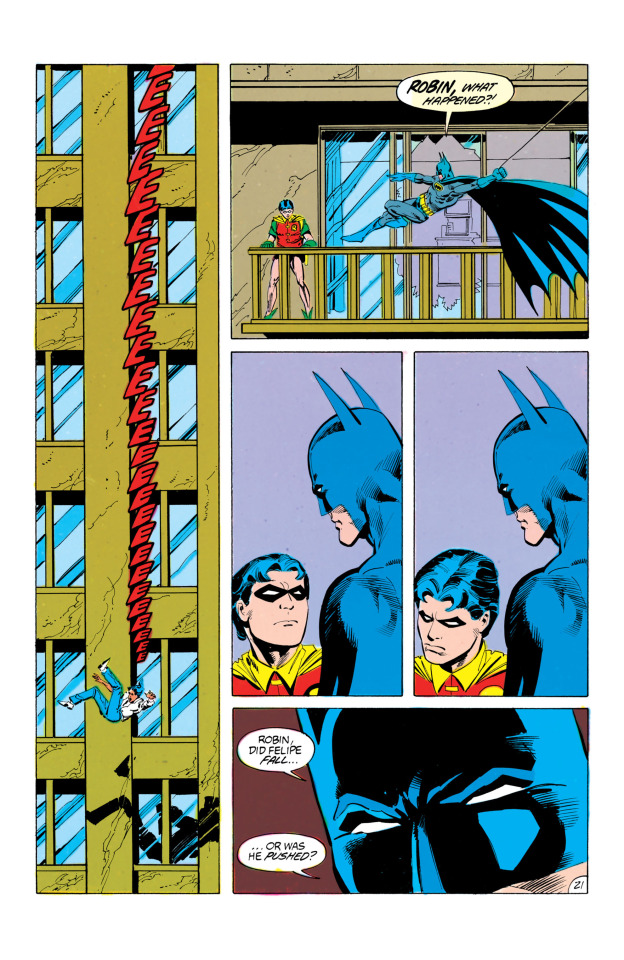
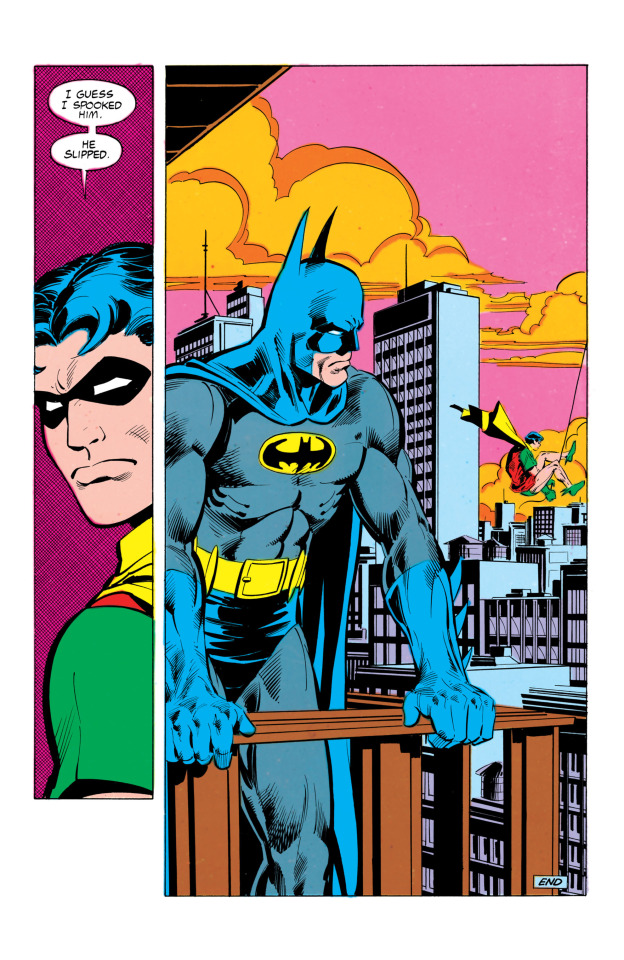
I’ve always thought it’s a good story and a lot more tasteful than it’s usually given credit for. It wouldn’t even have been the first time a “teenage superhero” has killed in the DCU (whether it was accidental or intentional); it’s certainly not something so dark and controversial that DC wouldn’t go for it, they could’ve easily just gone for it and had Jason Robin murder a criminal then, except they never really showed that he did. The audience just naturally assumed that he did because the whole scene was shown through Bruce’s view, and Bruce could see that even if Jason didn’t really kill the rapist then, he might very well be capable of it, and it makes the whole Under the Hood storyline as well as the continuation of Red Hood Jason possible.
The concept of Under the Hood and the continuing existence of Red Hood Jason works, instead of just being a complete character assassination like One-Year-Later Cass, only with Jason being his post-crisis version with all of his very established traits and his very established problems with Bruce.
If Under the Hood Jason is indeed Earth 1 Jason or similar to him, he would really need to be under some outside influence for him to do the things he had done, for there’s just no other justification for his action.
He would really have to be driven mad by the effect of the Lazarus Pit (which has only ever been showed to exist momentarily on other characters), he would have to be incapacitated the whole time, unable to control his own action or even form any conscious decision--and it would only make it extremely possible for him to do something truly awful such as killing some innocent or other heroes or even someone in the Batfam, since he wouldn’t be able to stop himself even if he wanted to, or be able to tell if that’s wrong; that’s what being incapacitated means, that’s why people who’s committed crimes, even as bad as murders, cannot be held legally accountable when they’re proven to be mentally ill--and if that’s truly the case, then Bruce as well as Dick (who had a pretty amicable relationship with Earth 1 Jason) and everybody else who has any knowledge about the matter would all have to be some real awful persons to not lift a finger to help him, by making it a point to stop him from committing any more murder that he wouldn’t have committed if he could help it, and figuring out a way to relieve him from the influence by means of the various science and magic overflowing in their world, like they’ve repeatedly done for many others who’ve been in the similar position, and eventually getting him the hell out of this altogether traumatic crime-fighting life, so he could finally begin to heal from his extensive traumas, including being forced to kill which has always been a very common cause of PTSD for soldiers at war; and even if Jason doesn’t leave the crime-fighting life forever, he could no longer continue operating as the Red Hood; it’d just make no sense for him to keep up the identity previously belonged to his murderer, and have it constantly remind him of how he didn’t just get brutally murdered, he was also forced into becoming a murderer himself, which.he never would’ve become if he wasn’t literally out of his mind.
Moreover, there could never have been a Tim Robin (even if Tim didn’t go by Robin but something else), if the Jason who died in A Death in the Family had the same disposition as Earth 1 Jason and none of his NE traits which was the one and only justification Bruce had for taking in Tim as his third teenage partner, seeing that Tim is patient and careful and cooperative with all the qualities to become the same kind of hero like Dick, and not at all “reckless” and “rebellious” like NE Jason, and so he’s likely to turn out like Dick and not get himself killed like Jason (that’s the only true significant retcon Pre52 Jason had. Although NE Jason Robin could be rather reckless and rebellious, that’s certainly not why he had gotten killed. They just made Bruce and everyone pretend that that’s what killed him, so it wouldn’t seem so utterly horrible for Bruce to endanger another teenage kid with no superpower or any previous fighting training by bringing them in the business that had already gotten one kid killed, and also for Dick and everyone else to just let him).
It’s a complete disregard of facts and logic to call Earth 1 Jason and Red Hood Jason the same character, which doesn’t really matter as long as it’s only headcanon; but when people push it as a fact, it really just sound to me like they’re saying that it’s wrong to like Pre 52 Jason/Post-Crisis Jason Robin, which I very much do because I actually think he’s an interesting character with an interesting and more coherent story than a lot of other DC characters.
It’s like they’re saying that it’s just plain wrong and unnatural for a person to have aggressive and violent tendencies and be inclined to criminal behavior simply because they had grown up in a most crime-infested place and had to rely on themselves and learned to do what it takes to survive since before twelve, or become more and more violent simply because they’ve been made to work in an extremely violent environment and have never been provided with any kind of actual aid for their mental health the entire time.
It’s like that if a person, after being brutally murdered and then coming back to find that their mentor/guardian who was the closest thing they had to a family and was also responsible for their death in a major way just didn’t seem to be giving any shit about that at all, is filled with such murderous rage that they could very well just go out and kill a bunch of criminals, but they aren’t actually a smol whump baby with no absolutely agency of their own that must be protected at all times all along, then they’re just no good at all and don’t deserve any love or respect or understanding.
...I don’t like myself for ranting about this. I hope I could just not give any shit about this dumb thing, but it’d been driving me crazy and I’d just got to let it out.
22 notes
·
View notes
Text
How to Beta Fanfic
The Librarian has been doing a few help posts, and this one on beta work has been in high demand! Hopefully authors and those looking to beta find this useful. Happy writing!
What is a beta?
A beta reader is someone who looks over a story before the author posts it publicly, checking it for some combination of spelling, grammar, cohesiveness, flow, plot holes, characterization, etc.
Why use a beta?
Authors can get so caught up in the story that it becomes difficult for their brain to focus in on the tiny typos. If you’re writing a story, your brain will make leaps around typos since it knows what you’re trying to say. A beta reader, someone from the outside, is a great help because every single word is new and fresh to their brain.
What makes a good beta?
Communicating with the author: Ask what they’re looking for since some authors only want help with spelling and grammar, while others want feedback on their story and style.
Correct typos and grammar within an author’s style. Instead of rewriting whole sentences, try to fix what is obvious and only suggest what could be considered “stylistic choices”. Maybe the author loves commas for spacing, so don’t get hung up on changing their style or flow.
Offer them a deadline. If you agree to beta 5k words, let the author know when you could have it done.
Think about pacing, flow, POV, and tense. Are you left confused after the scene? Does the tense switch from past to present? Does the POV switch characters or from first to third? All of these aspects are options for you to review.
Good beta feedback examples
“I’m confused about the choreography in this scene. Whose arm is going around the back?”
“I loved this joke!”
“Looks like you use a mix of present and past tense. Is there one you’d prefer I correct to?”
“There are six sentences in this paragraph that all start with the word “He”. It might read better with some variety.”
“This part is confusing because he acts like he knows this woman, but it’s the first time we’re seeing her.”
Poor beta examples
Nitpicking or arguing with an author. This is THEIR fic, and while your help should be appreciated, remember that this is not a collaboration.
Being vague and negative. “I don’t like this part” is of no help to an author. Be specific with reasons like, “You had Sirius acting very confident and then he’s suddenly very weak here, which confuses me without knowing the motivation for his change”.
It shouldn’t have to be said, but do not copy an author’s ideas, plot, or lines when you are given the privilege of an early read.
Authors: How to work with a beta
Make sure to thank them! Beta’s are volunteers that deserve praise too!
Run through spell check and reread it yourself FIRST.
Use multiple betas! The more help you get, the better your fic can be!
Do not assume that a beta knows what you want without talking to them. If you’re only looking for help with typos, say so upfront.
Do not assume a beta can correct an endless amount of words or is interested in reviewing the same piece multiple times after many changes. Ask for help with each chapter and version. This gives someone the chance to say no, since everyone who does this is only volunteering in their free time.
Do not ask a minor to beta explicit content.
Do not rush a beta. If you waited until the last minute to finish your fic before a festival, do not assume that a beta reader can drop everything to help.
Offer to reciprocate! Most betas are also authors, so if someone takes time to offer you help, please return the favor.
Where to find a beta/authors who need a beta
Festivals with servers are a great way to meet new people in the fandom, and find someone to beta/someone to beta for.
Tumblr! If you have a mutual who’s activity you’ve noticed in your dash, start a conversation! You can also make a post or put it in your profile header.
Join the beta discord server! This is great place to meet authors and betas! Message @museinabsentia for an invite link!
Alternatives to a beta
If you use Google Docs, click Tools and select “check spelling and grammar” for additional grammar suggestions on your fic.
Grammarly is a great online tool and browser extension that will allow you to set your style and country’s language.
Betas are NOT Sensitivity readers
A sensitivity reader is someone who is hired to read and assess a manuscript with a particular issue of representation in mind, one that they have personal experience with.
Just because you and a beta enjoy your fic, does not mean it is not potentially misrepresenting the people it portrays. As much as we talk about fiction being fantasy, when you write about people as if they’re real, it’s important to not push harmful stereotypes.
Make sure you stay open to critique from those you represent so you can grow as a writer and not further harmful words.
Note to Non-betas
Do not comment on published fics with corrections. Many, many fics have seemingly obvious mistakes, but remember that you do not know the author’s mental state, native language, education level, or desires. At most, thank the author with a detailed comment, and offer yourself as a beta for future works if you truly love their style.
Other helpful posts:
How To Tag Your Fic
How to Write Fanfic Summaries
How to gain friends & fans writing fanfic
243 notes
·
View notes
Note
Okay here's the thing.. I respect everyone's opinions and they can ship whoever they want but like... For Elucien and Gwynriel... I literally cannot even see how. I would gladly ship them if someone gave me a valid reason. Elain avoids talking or even being in the same room as Lucien, and Azriel had one polite conversation with Gwyn. Az is just nice to her. As nice as he would be to any female. Elriel has foreshadowing & chemistry- The roses painted on her drawer and the rose necklace...👀
Strongly agree with all of this!! My main problem with anything that's not elriel is that a lot of anti-elriel shippers completely ignore or erase Elain. With these ships, it's always what benefits Elain does or doesn't bring. It's so misogynistic, people just ignore everything she's mentioned about her own heart and how she doesn't want a mate or the bond, she doesn't care for it, but oh Lucien's had such a hard life, he deserves his mate!!!!!
😒😒😒
Surely he deserves someone who wants him as much as he wants them, no?
Non-elriel-endgame with the canon we currently have would mean Elain's choices are stripped once again since she'd have to give up/lose the love she actually wants in favour of one she doesn't want that's attached to some cultural concept that means zilch to her and her human heart. I mean, sure sjm could spin it so Elain catches feelings for Lucien and they end up happily mated. But then what is the point of having Elain constantly avoid him for three books? That's not even setting up for a good relationship bc every time they interact/meet, the communication just gets worse.
While I can honestly see the potential of gwynriel bc platonic interactions can later become romantic, I still don't ship it bc it doesn't feel right the way elriel does to me. I can def see gwynriel becoming a strong healthy friendship, but if it's endgame then Elain ends up with Lucien, whom she visibly shrinks from and has been avoiding since acowar. She doesn't feel seen by him at all - as much as I love Lucien and truly do want him to have his own HEA, we can't deny that he's really just pursuing (I use pursuing in the loosest way since he's very respectful about it 😅) Elain bc of the bond. If we take that away, there's nothing between them imo and he probably wouldn't give Elain more than a passing glance for her beauty and that's it bc she's not the type of girl he's into.
But people don't wanna think about how that makes Elain feel. This girl who previously felt seen by only one person - who then rejected her bc of that bond itself - and craves someone to see who she truly is, is being courted by someone who doesn't actually like her for her, but just the idea of what a relationship with her would entail. He's only trying bc of some divine belief she doesn't share. That must suck like hell. It's almost objectfying, the bond. And again, I don't blame Lucien at all, not even for trying bc it is something that's important to him and his culture, but it's not a mutual thing. If it were important to Elain too and she just wasn't cooperating bc of some stupid shallow reason, then I'd be angry at her. But that's not the case at all.
But with Azriel, the first person to see her since Graysen, there's so much potential for growth - for both of them. They make each other feel seen. And for all that antis say neither has grown in the time they've known each other, how did Az pluck up the courage to almost kiss Elain after having not done anything with Mor for five centuries? How did Elain initiate that kiss - ie have the courage to follow her heart again after having it torn and shredded by Graysen? And anyway, weve never seen into Elain's head so we don't know what she feels has changed within her; we can only detect subtle changes from other povs, but there might be some huge changes in her learnt from Azriel, maybe about her outlook on life/strength, that she's just keeping hidden for the time (or that no one has bothered to see bc Elain is invisible 😭). Same with Azriel. One little chapter isn't gonna tell us everything he's been thinking the past two years.
But either way, we know now that they both have feelings for each other. Why is a mutual healthy relationship shut down so quickly, one where both partners' choices are taken heed of? If Elain had said no in that moment, Azriel would've stepped back instantly, no questions asked. He probably would've have some huge internal conflict about his own self worth but he wouldn't have gone further without Elain's consent. He's already shown he respects her, he said they've been sharing looks and touches, and these are things fandom eat up, so I don't understand why it's suddenly wrong or unwanted just bc Elain makes up half the ship.
And there's so much foreshadowing/symbolism that antis seem oblivious to, which, fair enough, interpret the text how you want. But even if somebody doesn't see the spark or blooming feelings between the pair throughout the books (how do they explain away all the stiffness whenever one of them is mentioned or is in the same room or something though? Genuinely curious here), there's a lot of plot foreshadowing. The Blood Duel has now been mentioned twice, as has the idea of breaking the bond, maybe more. There's the issue with Koschei and Elain not being able to see things related to him past mist and shadow. There's all this potential conflict that could arise between the Courts if elriel pursue their love, and conflict is the driving force of any novel.
If gwynriel were an IRL couple, I wouldn't care if there were never any conflict, but if I'm reading their story, I want more than just them falling in love and having internal conflict about whether they should kiss the other or not. Especially if the backdrop is a fantasy world on the brink of war with many players. I saw a gwynriel post mentioning Merrill once and while I do think she has the potential to be a running antagonist, I don't see her as anything but a subplot/crony for/associate with another stronger villain. I don't think she could carry a whole novel at the moment. So Gwyn is tied to nothing in the overarching plot. Same with Az. Not to mention all the theories about the Koschei/Swan Lake/firebird folklore that is potentially inspiring this new series in the acotar world. Of course, this could all change as we get more info about the next book/s and all, but compared to elriel certainly, I don't think there's as much conflict with gwynriel.
Ultimately, I don't claim knowledge of the next books' content, so I don't really care what people ship, but the main thing I take issue with is how they treat Elain in the midst. A lot of gwynriel arguments I've seen portray certain acts in a romantic/positive light for Gwyn but either completely ignore or erase any semblance of romance for Elain or tear her down. Like, we shouldn't push the narrative that Gwyn as an SA survivor can't have healthy meaningful sex in the future (yeah, of course I agree), yet some of the same people who say that are also people who judge and make fun of Elain and call her too vanilla for Az without having a clue what her bedroom habits/preferences are 🤯 This is just one of many. There are so many double standards I've seen for gwynriel against elriel and I'm just tired of it. And even if they're not doing any of that, they simply hate Elain and don't want her to be with Az and so ship gwynriel as the next best alternative. Like, can they not push down Elain in favour of Gwyn, please? That's so misogynistic 🤮
For all that this fandom flaunts the series being feminist with strong female characters, they sure do a good job in tearing down females who don't fit their definition of strong, despite even Feyre stating and acknowledging multiple times that Elain has a different kind of strength 😒
Gahhhhhhh. *exhales deeeeeeeeply* Sorry this is so damn LONG!! 😅😅😅😅😅 I did not expect to write a whole bloody essay lol but I hope it was fun/comforting to read at least 😅😆 I know I fall back on elriel posts when the ship war gets too intense bc I actually enjoy shipping elriel. They've become my otp, and I absolutely adore both characters of the ship; I think most of us elriels do. I haven't really seen any elriel stans who dislike/don't care for Elain and her welfare so it's nice being in this corner of the fandom where we can appreciate both Az and Elain equally. And of course, the other characters with their due respect. I truly do want Lucien to finally get his good life, but I don't think that's with Elain 😕
56 notes
·
View notes
Text
Psycho Analysis is a series that looks at villains across various media in the hopes of coming to something of a consensus on the overall quality of the character. Are they performed well? Do they enrich the narrative? Are their motives fleshed out? Are they voiced by Tim Curry and thus a sex icon?
There are a lot of important questions that I look into, but ultimately, Psycho Analysis boils down to asking one simple little question: How bad can a character be?
Thankfully, there’s one villain who decided to answer that question for me... in song form.
Psycho Analysis: The Once-ler
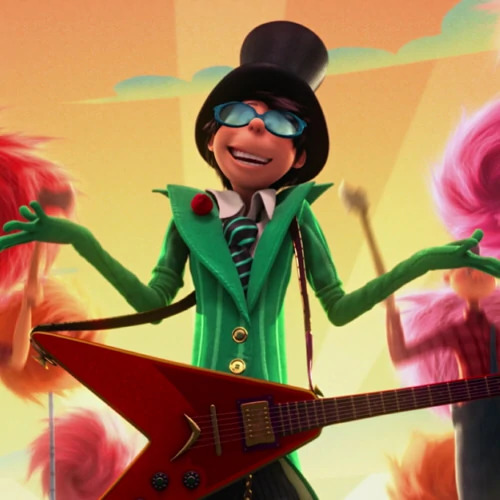
(WARNING! This analysis contains SPOILERS!)
Yeah, I’m finally talking about everyone’s favorite greedy bastard who, back in some of the darkest days of Tumblr history, ended up being the premier sexyman on the website. People were thirsting over this twiggy weirdo, acting as if he were God’s gift to women and shipping him with alternate versions of himself. Much like the movie he’s from, he is now incredibly hard to take seriously.
But hey, speaking of alternate versions of himself, I’m going to be covering him from the original book and the animated short film as well. Might as well just knock it all out of the park at once, right? Now let’s see how ba-a-a-ad this guy can be.
Motivation/Goals: The Once-ler is all about biggering. He’s making thneeds (things that everyone needs) and he is gonna stop at nothing to craft these things. Not even the power of the Lorax, Danny DeVito or otherwise, is going to stay his hand from getting that sweet, soft Truffula fluff to make his wares. This is ultimately a little unrealistic, at least for the Illumination version; if Danny DeVito asked me not to do something, I’d listen, no questions asked.
Performance: In the animated special, Bob Holt does double duty, as he is portraying both Once-ler and the title character. It works really well for what they’re going for, and the double casting is interesting because it highlights the ultimate role of the Lorax as the Once-ler’s conscience given form.
In the film, Ed Helms portrays the Once-ler, and he’s fine. He’s certainly better casting than Audrey, but that’s not particularly saying much considering that’s a non-singing Taylor Swift (when Cats is able to utilize Taylor Swift better than your musical, you know there’s trouble). I don’t know, Ed Helms is fun and all, but I’m just not sure his take on the Once-ler is all too compelling overall.
Final Fate: In the original book and the special, the Once-ler wins… but even he realizes it’s a terrible, pointless victory, and all he has achieved is ruin, his family leaving him, his business ultimately collapsing, and the environment permanently damaged. He’s left as a miserable, jaded hermit, broken by the bleak consequences his greedy actions have sown upon the world and only able to tell his story and pass on the last Truffula seed in the hopes that maybe, maybe someday the trees can regrow and the Lorax will return. The Illumination version follows this but then tacks on a happy ending where the Lorax and Once-ler reunite because as we know ambiguity and bittersweet endings cannot exist in children’s films.
Best Scene: Obviously it’s the scene where he shakes his ass to seduce Jack Frost, in one of the greatest gay romances ever put to film.
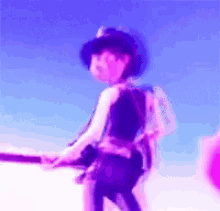
Joking aside, it is undoubtedly his villain song. It has become such a meme, but real talk? “How Bad Can I Be” slaps. This is a really good song, probably too good for the movie but you know what, I’ll take it.
youtube
Best Quote: HOW BA-A-A-AD CAN I BE? Yes, I’m using a line from his villain song. Sue me.
Final Thoughts & Score: What can one really say about the movie version of the Once-ler that hasn’t already been run into the ground? Well, how about… He’s not too bad, honestly? Like, yes, he has next to nothing to do with his book counterpart and they really go way too far into trying to make a capitalist pig sympathetic… but the animated special from the 70s did that too. I think the Once-ler honestly works better when there is a dash of complexity to him and he isn’t just a simple-minded Captain Planet villain.
Of course, the issue here is that the 70s version took a simpler approach, kind of less is more. The 70s Once-ler brings up some valid points to the Lorax about his work, and the Lorax can’t help but agree that there’s no easy answer while also stressing that the environmental devastation is still really, really bad. It works, it feels complex, and it arguably helps the ultimate point that we need to protect the environment better than even the book did (and I love the book, don’t get me wrong, but its take on the Once-ler is a bit too simple for its own good; it almost runs into the Femme Fatale problem by being a bit too much of a strawman). The movie version has a bit too much going on, especially with his family. His family are much more blatantly evil, greedy, and manipulative, but they’re relegated to the background for much of the film and don’t effect things all that much. The whole narrative would have been infinitely stronger if they were the greater scope villains behind Once-ler and were who needed to be defeated and maybe taught a lesson, but instead they are ignored in favor of someone I’ll address very shortly.
All of this leaves movie Once-ler feeling extremely disjointed, but not irredeemably so. As I said before, his villain song is unironically awesome, and as lame as it is compared to the more haunting, contemplative ending of the book and the special, I’m not so much of a curmudgeon that I didn’t at least smile when he finally reconciled with the Lorax. Ultimately though, him being memed to death really didn’t help his case, but it means I’m not giving the movie version anything less than a 3/10. He might in fact be the best “so bad it’s good” villain ever, or at least up there. He’s just so undeniably enjoyable even if the narrative isn’t making him as complex as it thinks it is. The animated special version gets a 9/10, the book version is a 7/10, and the Once-ler’s family gets a 5/10 for being an interesting concept they sadly do little with, which will now be elaborated on as I follow up on the foreshadowing from the last paragraph...
Psycho Analysis: Aloysius O’Hare
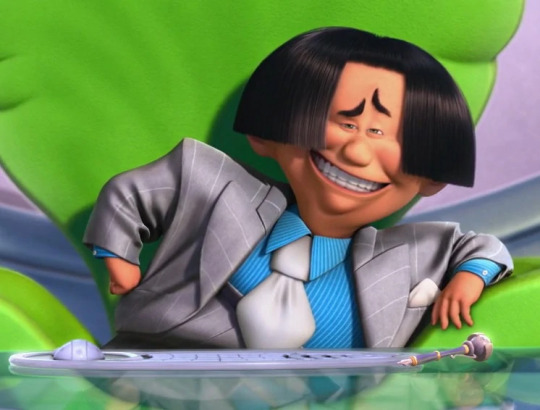
Remember how I said the Once-ler’s family gets ignored in favor of someone else? Here he is, Aloysius O’Hare, one of the absolute lamest villains ever put to screen.
Motivation/Goals: He’s greedy. That’s it. I’m not kidding. He’s just a cartoonish caricature of a rich person, which still makes him a realistic portayal but also makes him boring as sin compared to the wacky dude with a big musical number about how bad he can be.
Performance: Rob Riggle does a decent job, but there’s really not much for him to work with here. This character is a cardboard cutout who exists to be as cartoonishly greedy and evil as possible with no nuance so the kids know who to root against and so that Once-ler doesn’t look bad in comparison.
Final Fate: Look, he’s a blatantly evil corporate villain in a kid’s movie about the environment. Of course he gets defeated and everyone turns on him. What’s especially funny though is that, on the brink of learning his lesson, he rejects any form of redemption and just goes whole hog on being a villain.
Best Scene: I will absolutely give him this: in the face of his ultimate defeat, after having the virtues of trees sung to him and the entire town turning on him, he for a moment contemplates turning over a new leaf… and then absolutely rejects the thought and instead decides being evil is just too much fun, at which point he tries to get everyone back on his side by seeing a funny little song about death while wavedashing. If more shitty villains did this, I don’t think there would be shitty villains.
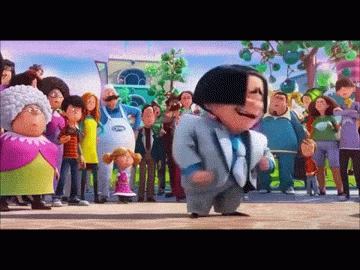
Best Quote: LET IT DIE, LET IT DIE, LET IT SHRIVEL UP AND DIE! Yes I’m quoting a song again.
Final Thoughts & Score: Look, I’m not gonna mine words here: O’Hare sucks. Big time. He is a prime example of why The Lorax failed as an adaptation. In a story that is dealing with a moral grayness with no easy answers, O’Hare is just a big, blatant target, a dark shade of black in terms of black-and-white morality. He’s like a reject Captain Planet villain with Edna Mode’s haircut.
The movie would have been infinitely better if, instead of him, the Once-ler’s family were in control of the town, and they needed to learn the lesson about saving the trees instead of simply vanishing from the story. They were shown to be overbearing, manipulative, and greedy, and they had a much more personal connection with Once-ler being, you know, his actual family. The fact they abandon him and never really get any sort of comeuppance despite being perhaps the most evil people in the move, egging on Once-ler and taking full advantage of him, makes O’Hare all the more egregious, because there could have been some strong thematic elements that would have tied the film together and made it come off as much less preachy and more nuanced.
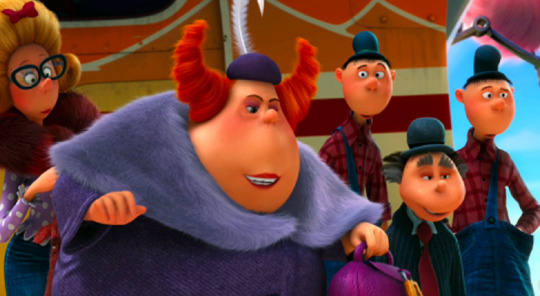
But we don’t live in a world where that happened, we live in a world where we got O’Hare. Aside from some genuine hilarity from him at the end, O’Hare really adds very little to the film. I gotta give him a 2/10, but I will say he’s a lot closer to a 3 than he is to a 1; there’s no denying his absolute rejection of learning a moral is absolutely hilarious. I love when villains do that. It’s just a shame those funny moments are wrapped up in something monumentally unimpressive.
37 notes
·
View notes
Text
This is just me talking about (my) asexuality and aromanticism and mainly about how I figured I'm aroace. I'm from Finland and recently turned 30 so my experience and "lgbt+ history" might not be what you know it as, especially if you are not from Europe, or if your native language is English.
Also this is highly personal, so I doubt anyone here will have 100% same experience. But that's fine because remember: we're all individuals here and these are NEVER universal. You're still valid even if you wouldn't relate to what being aspec is to me.
It might be IS a long post so beware, but I've just been feeling like writing down some thoughts so here we go...
What I have been able to track is that I was 17, in 2008, when I first stumbled upon the term "asexuality". I don't remember exactly how, but I just remember reading about it and immediately going "yeah that's me". But what I do remember is that no one talked it being about sexual attraction. Basically how understood it was: asexuality = sex-repulsion.
I was 17, and somehow I knew I was sex-repulsed, but at the same time also thought I'm just a minor, so it's normal to be sex-repulsed. But even after turning 18, I don't recall ever feeling sexual attraction. I didn't think of myself as a "late bloomer" but just as someone who just has no interest towards sex. At some point I became really anxious of men, however. Nothing has ever happened to me* but still I, for some reason, developed terrible fear of men. I'm afab and just did not want to be seen as an object, and it made, still makes me, terrified to think someone might look at me and have Emotions. I know that we can't control our brains, I mean, I can't look at someone and force myself to feel attraction - just like those who do feel attraction, can't force themselves to stop feeling attraction. They can only control their actions. But yeah, I also had horrible (sexual) intrusive thoughts due to my generalized anxiety disorder at some point, which did not really help. They got a bit better when I came into terms with my asexuality and aromanticism, but sometimes they still come at me and it's never fun, but at least they're not as strong as what they used to be.
*(Unless if you can count that as sexual harrasment when, CW, I was 11 and a classmate was "into" me and tried to touch my face and talk "sweet things" to me but made it into a show despite me being uncomfortable and usually crying cos as a neurodivergent I didn't know how else to react.)
But anyway, back to the topic. So for years I understood asexuality as sex-repulsion, but I guess it's because I, well, am a sex-repulsed ace. So if I'm sex-repulsed, why would I then look at someone and feel something if I'm repulsed by the thing anyway? Like, it probably can't get any simpler than this :D And I know today that it's not as simple anymore. But that was 2008, at school (in ~2005) they only talked about gays a little, on one page in a sex.ed. book that otherwise was maybe 100 pages long. Only one page. About gays. And it was basically "Some boys like boys or some girls like girls and it's totally fine." and that was it, but the overall assumption was that everyone likes someone. And also there were no romantic orientations. Liking someone = both sexually and romantically. Not liking = not a thing except when you were depressed or otherwise mentally ill, or autistic or mentally disabled (which is a SUPER ableist take btw). I don't remember teachers ever talking about this, but it could also just be my adhd, maybe they did mention, but I just don't remember. At least in my notebooks there is no mention of this, everything was very much heteronormative and amatonormative, and also there was only two genders. I don't remember ever hearing about transgender people, apart from foreign documentaries and in them they were always portrayed as some shocking freaks of the nature, and loads of wrong terms were used. And this is still the mid and late 2000s we're talking about!
So this takes us to the other part aka aromanticism. Back then asexuality was not only sex-repulsion but also merged together with aromanticism, because people didn't talk about romantic orientations yet. So asexuality was not only sex-repulsion, but also you simply just not wanting a relationship. Again, nothing about attraction, just someone who did not care about sex nor relationships. A "forever single", if you will.
This was already annoying me a lot back then because I was really annoyed by sex "running the world". I was so angry because why is asexual the only sexuality that doesn't like sex? All the other sexualities had the assumption of them always wanting to have sex. Like, even think about someone who is straight, you hear that someone is straight, and you automatically assume(d) that oh they're into sex too cos why wouldn't they be. This was really driving me nuts because I was sure there are people who want to have a partner, but never want to have sex! I was still experiencing crushes, and I knew for sure it was nothing sexual, so it annoyed me that just because I'm asexual, it means I can't have crushes. That's why I actually called myself as "asexual bi" for a while, because "bisexual" indicated I would have not been sex-repulsed and I wanted to point out that I'm NOT into sexual things, at all - and remember that this was still the late 2000s or early 2010s and I had not heard of romantic orientations yet! So I was up to something, there just were no terms for that yet! Today that would be called bi-/panromantic asexual.
I haven't been able to track the exact date or even year when did I figure out I'm aromantic, or when did I hear about romantic orientations for the first time. From the messages I've been able to find, I was already in my early 20s. Aka somewhere around maybe 2011-2013. In those, I have still been wondering what I am or if I even want to have a relationship, not being really able to tell what I wanted or didn't want. Again, no one told me romantic orientations are about ATTRACTION and not about whether you have commitment issues or not (this as a half-joke, cos I have severe commitment issues with everything :D I need to feel free!).
Anyway, I do remember my key moment with aromanticism, or the "aromantic awakening" as you could call it too, was when I was 17 or 18. Or maybe I was older? I don't know, I have time blindness. Anyway, I had this one online friend I had a "crush" on (I think it was just undiagnosed adhd's person hyperfixation) and I even told her about it. Everything just is super shady, from those years, I was not really on my best and there are so many overlapping memories that feel like different alternative universes instead of memories on a same timeline. Anyway, I just remember at some point thinking about this girl and I thought about some "romantic" stuff, like kissing, and I just remember my brain going "NOOOOOPE!" I had wanted to meet with her some day so bad, but when I started thinking about actually meeting with her, I started to nope the fuck out. All I had in my head was awkward embarrassing "first kiss" scenarios from movies and I just was not having it! I basically went "lol I guess I'm aro too, then XD" but I still don't remember when did I have this realization. Was I 17? Or was I, say, 22? I guess I need to go through my old MSN Messenger and Skype convos some day to investigate this further because I really want to know. I couldn't even find anything from my Tumblr from those times (I registered here in 2011), but I don't know if that's just me not tagging or Tumblr search functioning normally (aka it never finds anything).
But yeah, I am touch-repulsed. And kiss-repulsed, and romance-repulsed, too, (unless it's my OTP we're talking about). I'm still not exactly sure if I'm touch repulsed because I'm aromantic, or if I'm aromantic because I'm touch-repulsed. I only know that because of my sensory issues (I'm neurodivergent), I have never liked touching nor being touched. Even as a little kid I hated hugs and never liked sitting on anyone's lap. I only tolerated my parents, mainly my mom, because they were my safe place as an extremely shy baby/toddler/kid, who was especially wary about men. I can't explain the latter, but there was something about adult men that caused me (as a baby) to hide my face against my mom's shoulder if they talked to me. I did that to everyone I didn't know, but especially to men I didn't know. No idea why.
I also remember how my siblings loved to sit on people's laps and were always climbing onto their laps, and I didn't like this. And once my (late) grandma was so touched when she asked me if I want to sit on her lap (I was maybe 5-7?) and I agreed just to make her happy. I still remember how it felt, and I did not like it at all, but it still made my grandma so happy that I THINK she almost cried when she told my mom I actually agreed to sit on her lap. I'm not sure how real this last part of the memory is because I was so young. But I do remember thinking I do that for a change because I knew my grandma would be happy.
So yeah, my touch-repulsion is not exactly a new thing but just something that has been a part of my personality forever. But is that the core reason for why I only feel aesthetic attraction? I never look at people and feel like I wanna touch. More of the opposite, the idea of having to touch them or them touching me makes me go "eeewww". If you have seen that video of a gibbon shaking their whole body after seeing a rat in their exhibit? That's what I feel like when I think about touching or being touched, in just any way, also platonically.
The only time I feel "sensual attraction" is when I see photos or videos of animals. The urge to pet a tiger is insane. But the feel of another human's skin or muscle (or hair or whatever) is very repulsive to me.
I still remember how disgusting it felt to e.g. sit on a cousin's lap. We sometimes used swings like this, and somehow I was aware of it not feeling nice, but still not doing anything about it cos it also was okay? Only later I have realized I really, really loathe the texture of human skin. Or the warmth and overall feeling of a human body. For example, I was at least 7 or younger when I sat on my cousin's lap while we were sitting on a swing and STILL, after over 20 years, I have that all in my body memory. I remember how the thigh bone felt under my legs and how freaking disgusting the muscles felt inbetween. Also at school, on the 1st grade, we often had to walk in a line of twos after the teacher and hold the pair's hand so no one gets lost. My then-friend had so ridiculously dry skin that the only thing I could think of was how I felt like throwing up because the skin on her palm felt so damn disgusting. I still can feel that in my hand when I think of it. That's one of my "core memories" from 1st grade - how disgusting the human skin can feel like.
I don't think I have ever felt actual romantic attraction towards anyone. It's really difficult to differentiate because as I mentioned, I get those people hyperfixations easily. I guess it's the same hormones but I never really want to do anything with them? I guess it's the emotional intimacy that "attracts" me and what gets me excited, but I'm still not exactly sure what emotional intimacy means to me. I don't exactly fall into the QPR category either, in a way I wish I had a best friend whose best friend also I would be, and that neither would have anyone else who is "better" than the other one. But the only intimacy there would be emotional intimacy, nothing else. And I need my freedom so I wouldn't move in with any human being, either.
Sometimes I've thought my "ideal partner" would be a robot because if I get annoyed, I could just turn it off and stuff into a closet and leave there, and if I felt like not having a "relationship" anymore, I could just remove the harddrive and destroy the robot, or both. That way I would be the only one with the memories, and I wouldn't have to worry about someone out there knowing things about me, things that only the closest can know, and I'm really afraid of letting anyone close in case it won't work (also with regular friendships) because I can't stop thinking about how much I wish I had that MIB memory cancelling device so that they would again know almost nothing, or at least much much less about me. There's already one friendship that ended a few years ago and I still keep thinking about how I wish I could take everything back and how I wish they delete(d) all the files and drawings and stuff I sent them. There are so many things about me I wish I never told them, now as we are no longer friends. Back then it felt like "of course this is gonna last a lifetime!" but turns out that nope, not all friendships will.
I guess it's time to stop rambling. This post is really long already. If you read it all the way here: congrats. And thanks. You probably just wasted your time but... that's on you I guess :DDD But yeah, some thoughts from a 30-years-old aroace who has been aware of their identity for at least or almost 10 years now.
8 notes
·
View notes
Text
Avatar: Cultural Appreciation or Appropriation?
I love Avatar: the Last Airbender. Obviously I do, because I run a fan blog on it. But make no mistake: it is a show built upon cultural appropriation. And you know what? For the longest time, as an Asian-American kid, I never saw it that way.
There are plenty of reasons why I never realized this as a kid, but I’ve narrowed it down to a few reasons. One is that I was desperate to watch a show with characters that looked like me in it that wasn’t anime (nothing wrong with anime, it’s just not my thing). Another is that I am East Asian (I have Taiwanese and Korean ancestry) and in general, despite being the outward “bad guys”, the East Asian cultural aspects of Avatar are respected far more than South Asian, Middle Eastern, and other influences. A third is that it’s easy to dismiss the negative parts of a show you really like, so I kind of ignored the issue for a while. I’m going to explain my own perspective on these reasons, and why I think we need to have a nuanced discussion about it.
Obviously, the leadership behind ATLA was mostly white. We all know the co-creators Bryan Konietzko and Michael Dante DiMartino (colloquially known as Bryke) are white. So were most of the other episodic directors and writers, like Aaron Ehasz, Lauren Montgomery, and Joaquim Dos Santos. This does not mean they were unable to treat Asian cultures with respect, and I honestly do believe that they tried their best! But it does mean they have certain blinders, certain perceptions of what is interesting and enjoyable to watch. Avatar was applauded in its time for being based mostly on Asian and Native American cultures, but one has to wonder: how much of that choice was based on actual respect for these people, and how much was based on what they considered to be “interesting”, “quirky”, or “exotic”?
The aesthetic of the show, with its bending styles based on various martial arts forms, written language all in Chinese text, and characters all decked out in the latest Han dynasty fashions, is obviously directly derivative of Asian cultures. Fine. That’s great! They hired real martial artists to copy the bending styles accurately, had an actual Chinese calligrapher do all the lettering, and clearly did their research on what clothing, hair, and makeup looked like. The animation studios were in South Korea, so Korean animators were the ones who did the work. Overall, this is looking more like appreciation for a beautiful culture, and that’s exactly what we want in a rapidly diversifying world of media.
But there’s always going to be some cherry-picking, because it’s inevitable. What’s easy to animate, what appeals to modern American audiences, and what is practical for the world all come to mind as reasons. It’s just that… they kinda lump cultures together weirdly. Song from Book 2 (that girl whose ostrich-horse Zuko steals) wears a hanbok, a traditionally Korean outfit. It’s immediately recognizable as a hanbok, and these dresses are exclusive to Korea. Are we meant to assume that this little corner of the mostly Chinese Earth Kingdom is Korea? Because otherwise, it’s just treated as another little corner of the Earth Kingdom. Korea isn’t part of China. It’s its own country with its own culture, history, and language. Other aspects of Korean culture are ignored, possibly because there wasn’t time for it, but also probably because the creators thought the hanbok was cute and therefore they could just stick it in somewhere. But this is a pretty minor issue in the grand scheme of things (super minor, compared to some other things which I will discuss later on).
It’s not the lack of research that’s the issue. It’s not even the lack of consideration. But any Asian-American can tell you: it’s all too easy for the Asian kids to get lumped together, to become pan-Asian. To become the equivalent of the Earth Kingdom, a mass of Asians without specific borders or national identities. It’s just sort of uncomfortable for someone with that experience to watch a show that does that and then gets praised for being so sensitive about it. I don’t want you to think I’m from China or Vietnam or Japan; not because there’s anything wrong with them, but because I’m not! How would a French person like to be called British? It would really piss them off. Yet this happens all the time to Asian-Americans and we are expected to go along with it. And… we kind of do, because we’ve been taught to.
1. Growing Up Asian-American
I grew up in the early to mid-2000s, the era of High School Musical and Hannah Montana and iCarly, the era of Spongebob and The Amazing World of Gumball and Fairly Odd Parents. So I didn’t really see a ton of Asian characters onscreen in popular shows (not anime) that I could talk about with my white friends at school. One exception I recall was London from Suite Life, who was hardly a role model and was mostly played up for laughs more than actual nuance. Shows for adults weren’t exactly up to par back then either, with characters like the painfully stereotypical Raj from Big Bang Theory being one of the era that comes to mind.
So I was so grateful, so happy, to see characters that looked like me in Avatar when I first watched it. Look! I could dress up as Azula for Halloween and not Mulan for the third time! Nice! I didn’t question it. These were Asian characters who actually looked Asian and did cool stuff like shoot fireballs and throw knives and were allowed to have depth and character development. This was the first reason why I never questioned this cultural appropriation. I was simply happy to get any representation at all. This is not the same for others, though.
2. My Own Biases
Obviously, one can only truly speak for what they experience in their own life. I am East Asian and that is arguably the only culture that is treated with great depth in Avatar.
I don’t speak for South Asians, but I’ve certainly seen many people criticize Guru Pathik, the only character who is explicitly South Asian (and rightly so. He’s a stereotype played up for laughs and the whole thing with chakras is in my opinion one of the biggest plotholes in the show). They’ve also discussed how Avatar: The Last Airbender lifts heavily from Hinduism (with chakras, the word Avatar itself, and the Eye of Shiva used by Combustion Man to blow things up). Others have expressed how they feel the sandbenders, who are portrayed as immoral thieves who deviously kidnap Appa for money, are a direct insult to Middle Eastern and North African cultures. People have noted that it makes no sense that a culture based on Inuit and other Native groups like the Water Tribe would become industrialized as they did in the North & South comics, since these are people that historically (and in modern day!) opposed extreme industrialization. The Air Nomads, based on the Tibetan people, are weirdly homogeneous in their Buddhist-inspired orange robes and hyperspiritual lifestyle. So too have Southeast Asians commented on the Foggy Swamp characters, whose lifestyles are made fun of as being dirty and somehow inferior. The list goes on.
These things, unlike the elaborate and highly researched elements of East Asian culture, were not treated with respect and are therefore cultural appropriation. As a kid, I had the privilege of not noticing these things. Now I do.
White privilege is real, but every person has privileges of some kind, and in this case, I was in the wrong for not realizing that. Yes, I was a kid; but it took a long time for me to see that not everyone’s culture was respected the way mine was. They weren’t considered *aesthetic* enough, and therefore weren’t worth researching and accurately portraying to the creators. It’s easy for a lot of East Asians to argue, “No! I’ve experienced racism! I’m not privileged!” News flash: I’ve experienced racism too. But I’ve also experienced privilege. If white people can take their privilege for granted, so too can other races. Shocking, I know. And I know now how my privilege blinded me to the fact that not everybody felt the same euphoria I did seeing characters that looked like them onscreen. Not if they were a narrow and offensive portrayal of their race. There are enough good-guy Asian characters that Fire Lord Ozai is allowed to be evil; but can you imagine if he was the only one?
3. What It Does Right
This is sounding really down on Avatar, which I don’t want to do. It’s a great show with a lot of fantastic themes that don’t show up a lot in kids’ media. It isn’t superficial or sugarcoating in its portrayal of the impacts of war, imperialism, colonialism, disability, and sexism, just to name a few. There are characters like Katara, a brown girl allowed to get angry but is not defined by it. There are characters like Aang, who is the complete opposite of toxic masculinity. There are characters like Toph, who is widely known as a great example of how to write a disabled character.
But all of these good things sort of masked the issues with the show. It’s easy to sweep an issue under the rug when there’s so many great things to stack on top and keep it down. Alternatively, one little problem in a show seems to make-or-break media for some people. Cancel culture is the most obvious example of this gone too far. Celebrity says one ignorant thing? Boom, cancelled. But… kind of not really, and also, they’re now terrified of saying anything at all because their apologies are mocked and their future decisions are scrutinized. It encourages a closed system of creators writing only what they know for fear of straying too far out of their lane. Avatar does do a lot of great things, and I think it would be silly and immature to say that its cultural appropriation invalidates all of these things. At the same time, this issue is an issue that should be addressed. Criticizing one part of the show doesn’t mean that the other parts of it aren’t good, or that you shouldn’t be a fan.
If Avatar’s cultural appropriation does make you uncomfortable enough to stop watching, go for it. Stop watching. No single show appeals to every single person. At the same time, if you’re a massive fan, take a sec (honestly, if you’ve made it this far, you’ve taken many secs) to check your own privilege, and think about how the blurred line between cultural appreciation (of East Asia) and appropriation (basically everybody else) formed. Is it because we as viewers were also captivated by the aesthetic and overall story, and so forgive the more problematic aspects? Is it because we’ve been conditioned so fully into never expecting rep that when we get it, we cling to it?
I’m no media critic or expert on race, cultural appropriation, or anything of the sort. I’m just an Asian-American teenager who hopes that her own opinion can be put out there into the world, and maybe resonate with someone else. I hope that it’s given you new insight into why Avatar: The Last Airbender is a show with both cultural appropriation and appreciation, and why these things coexist. Thank you for reading!
#reposting this without the cut so that it survives with my new url!#avatar#avatar the last airbender#atla#cultural appropriation#culture#atla crit#meta#criticism#racism tw#self rb#citrina writes
82 notes
·
View notes